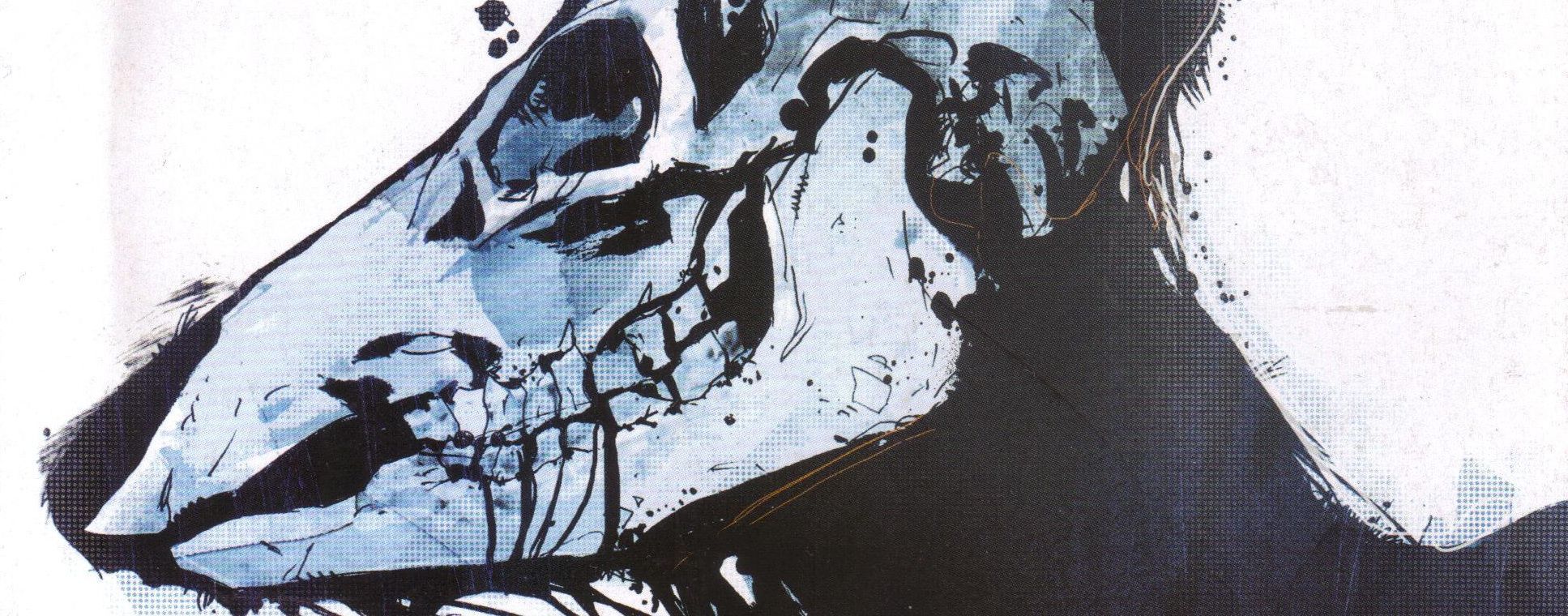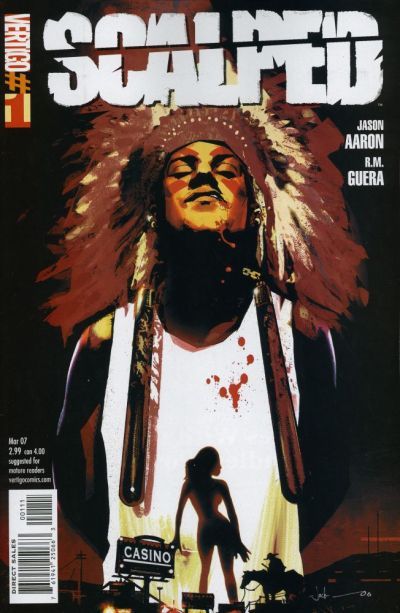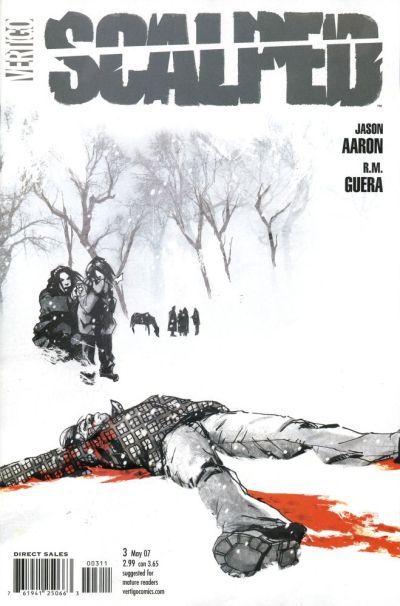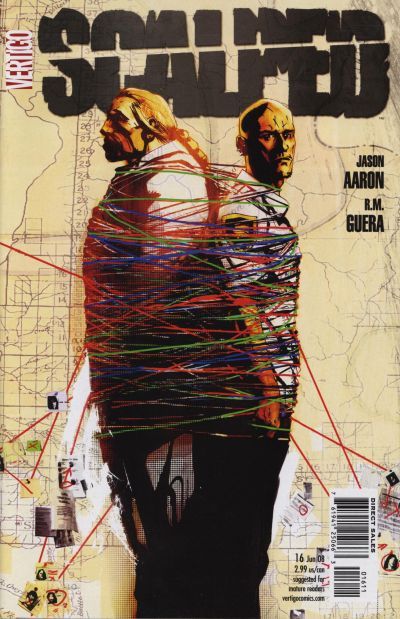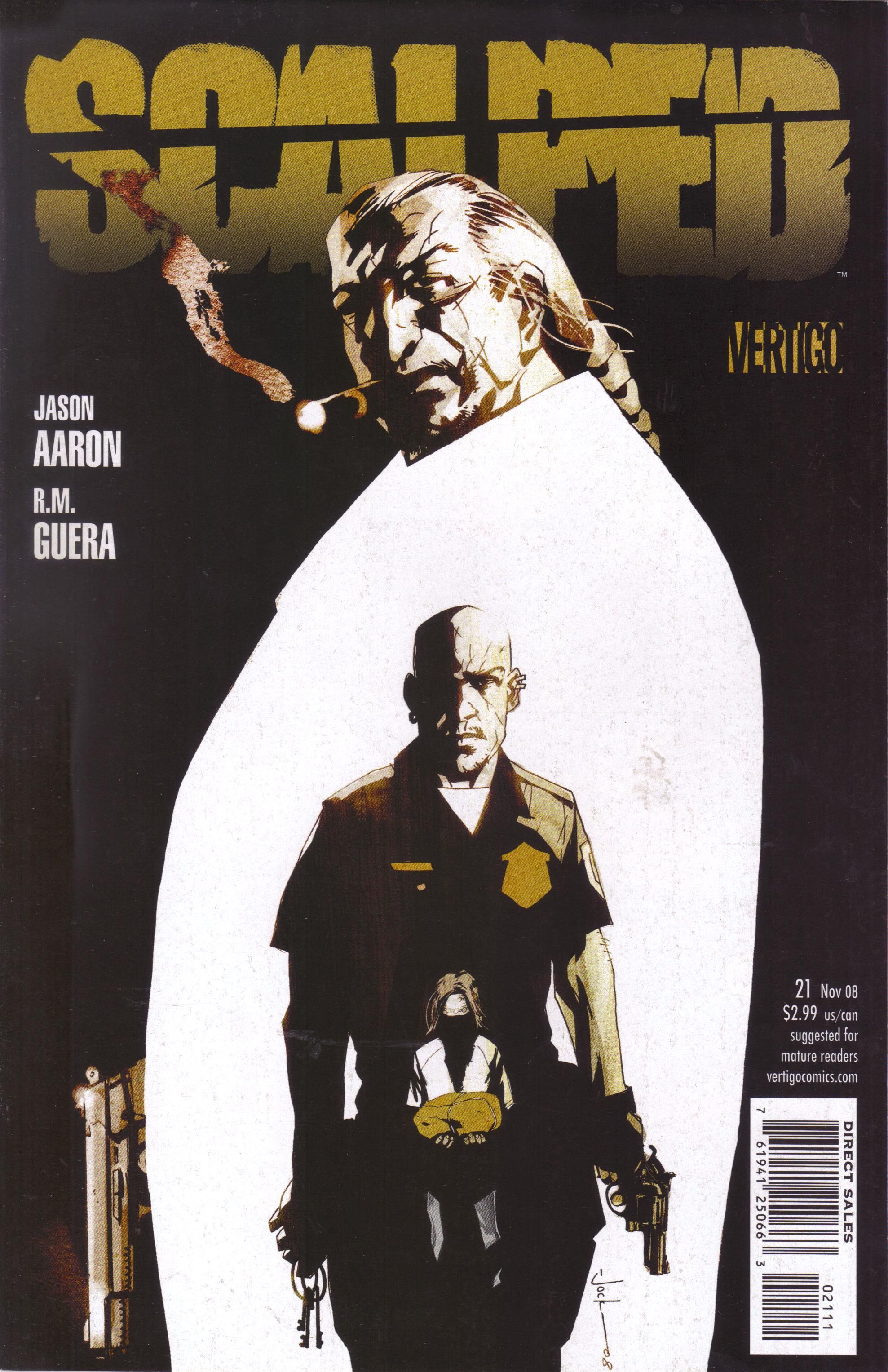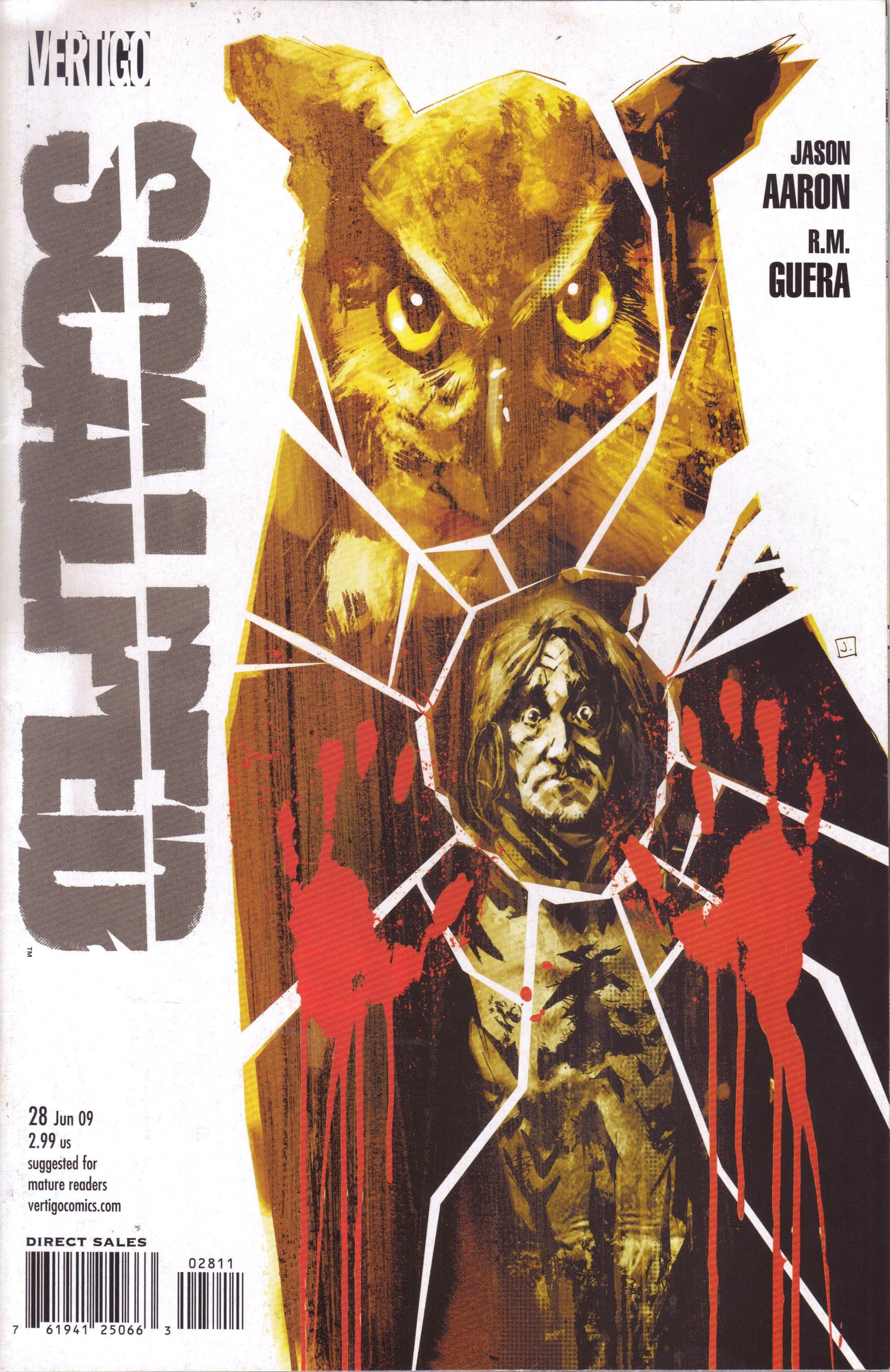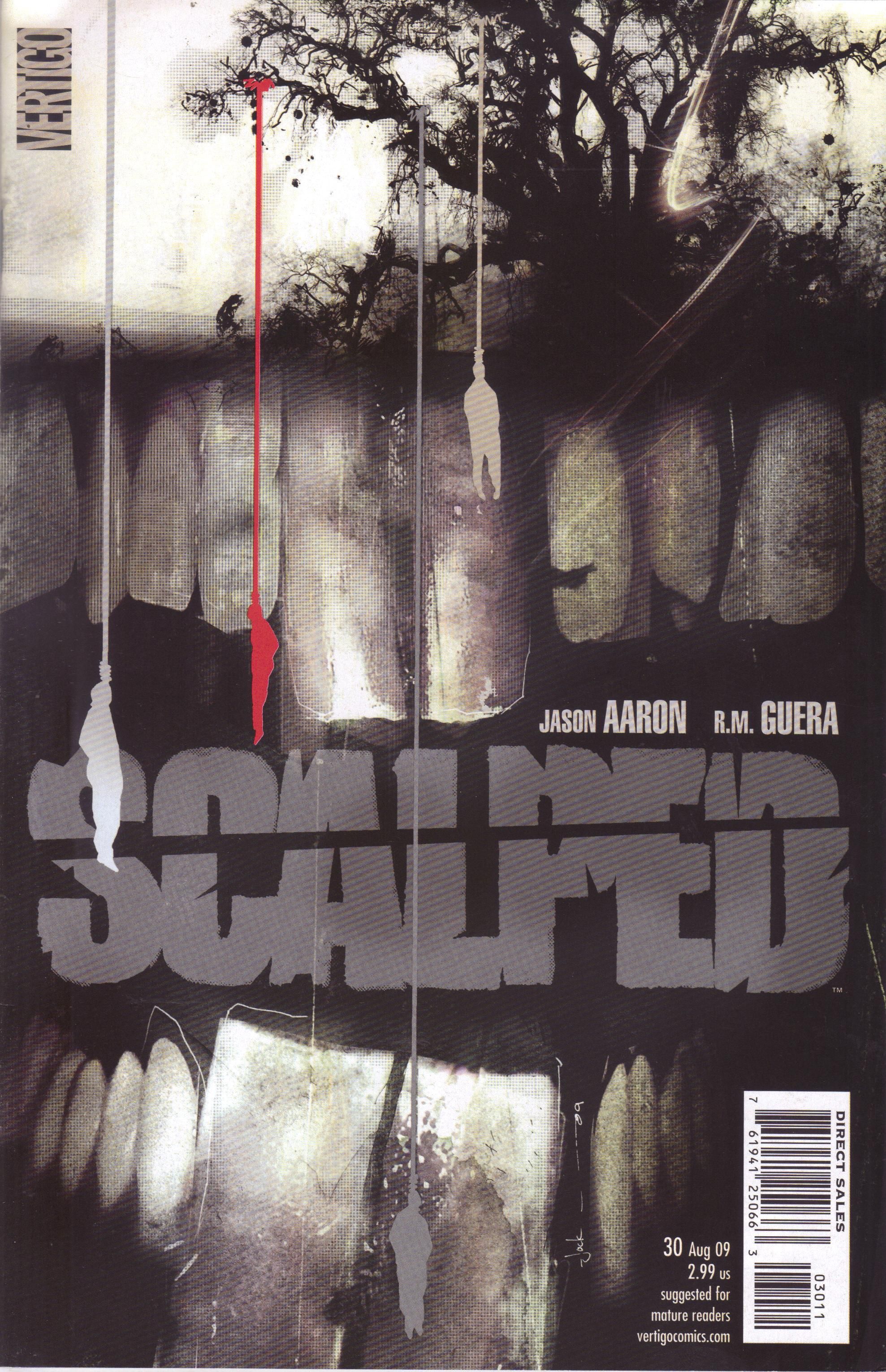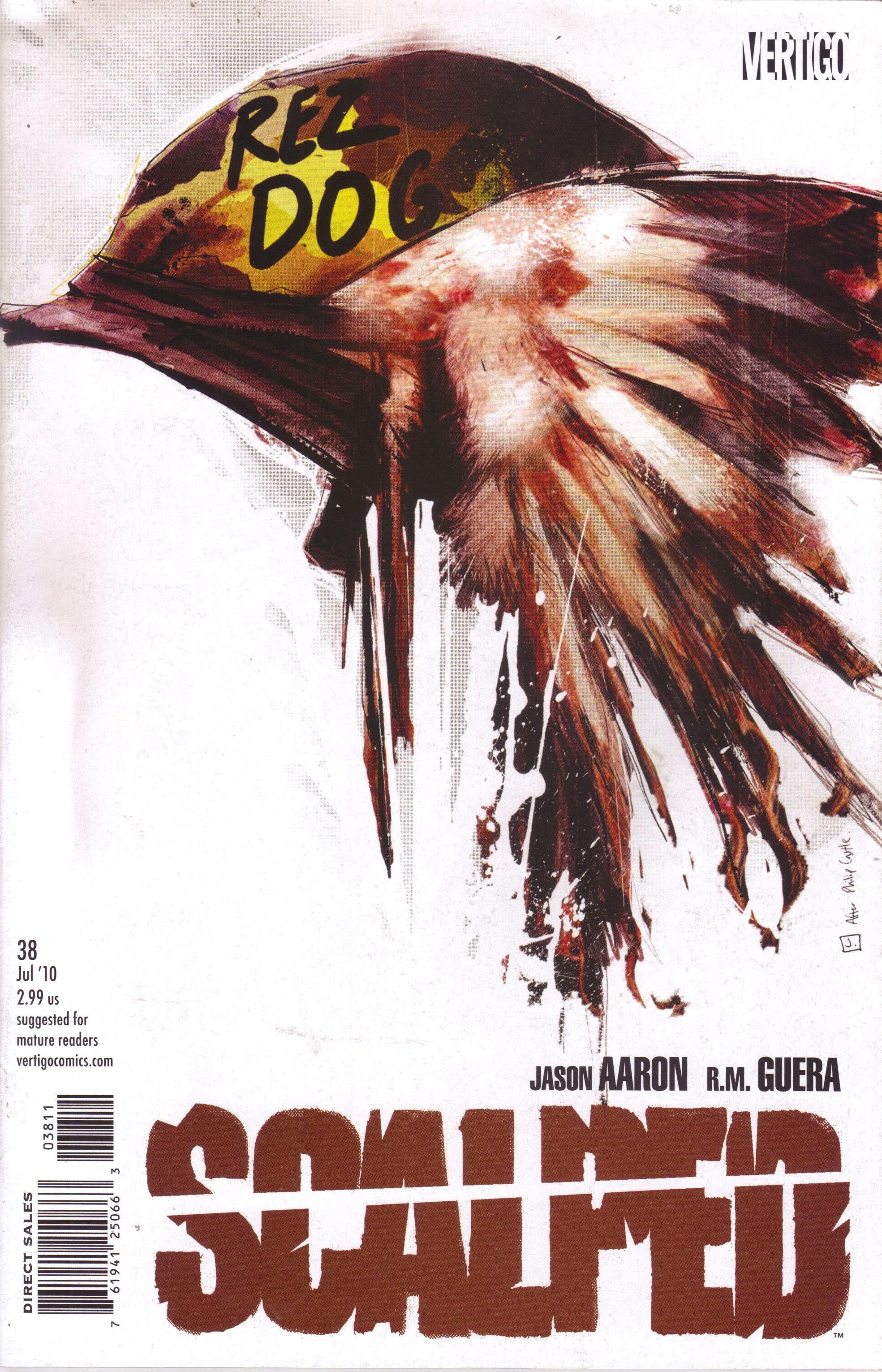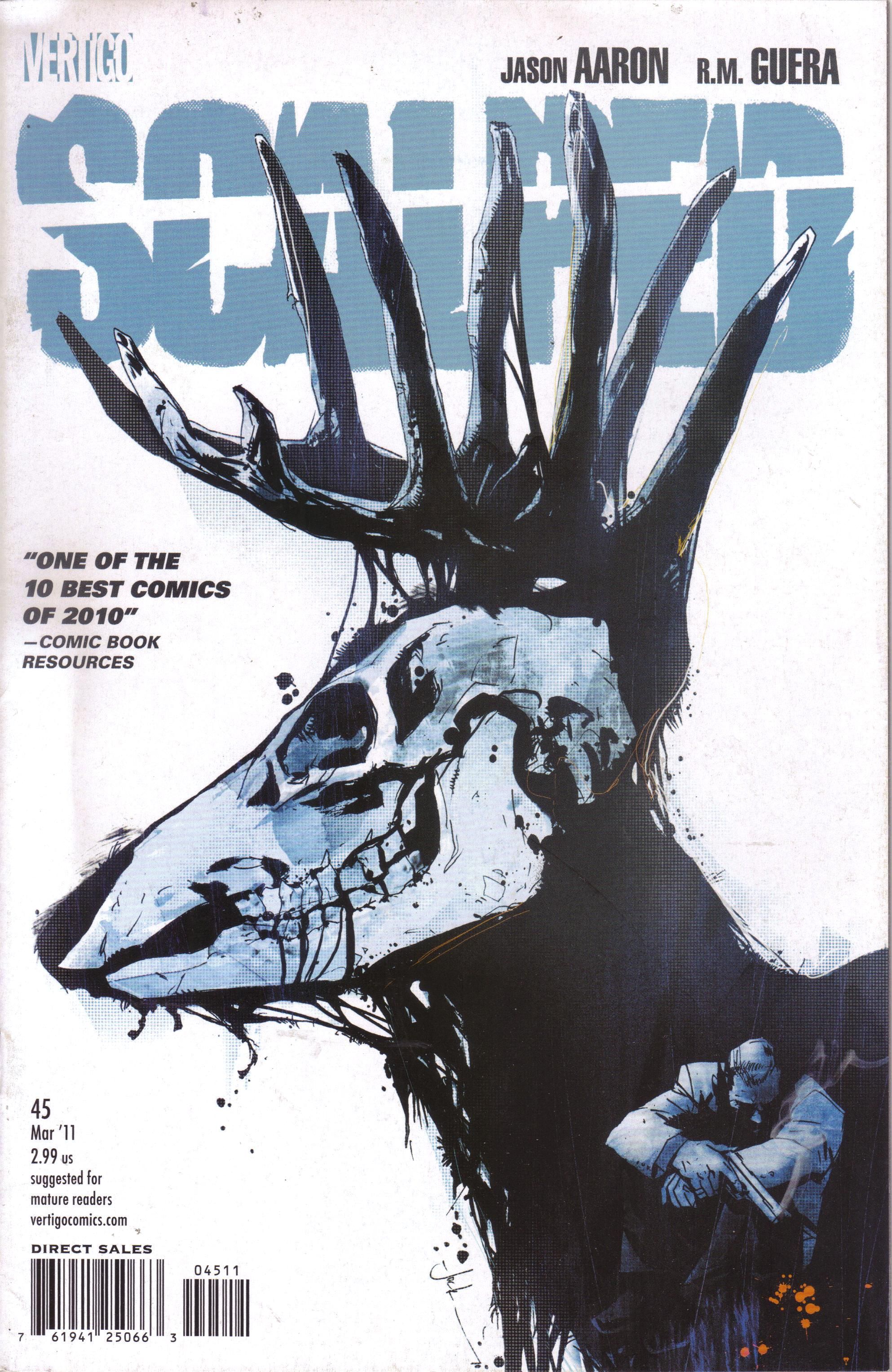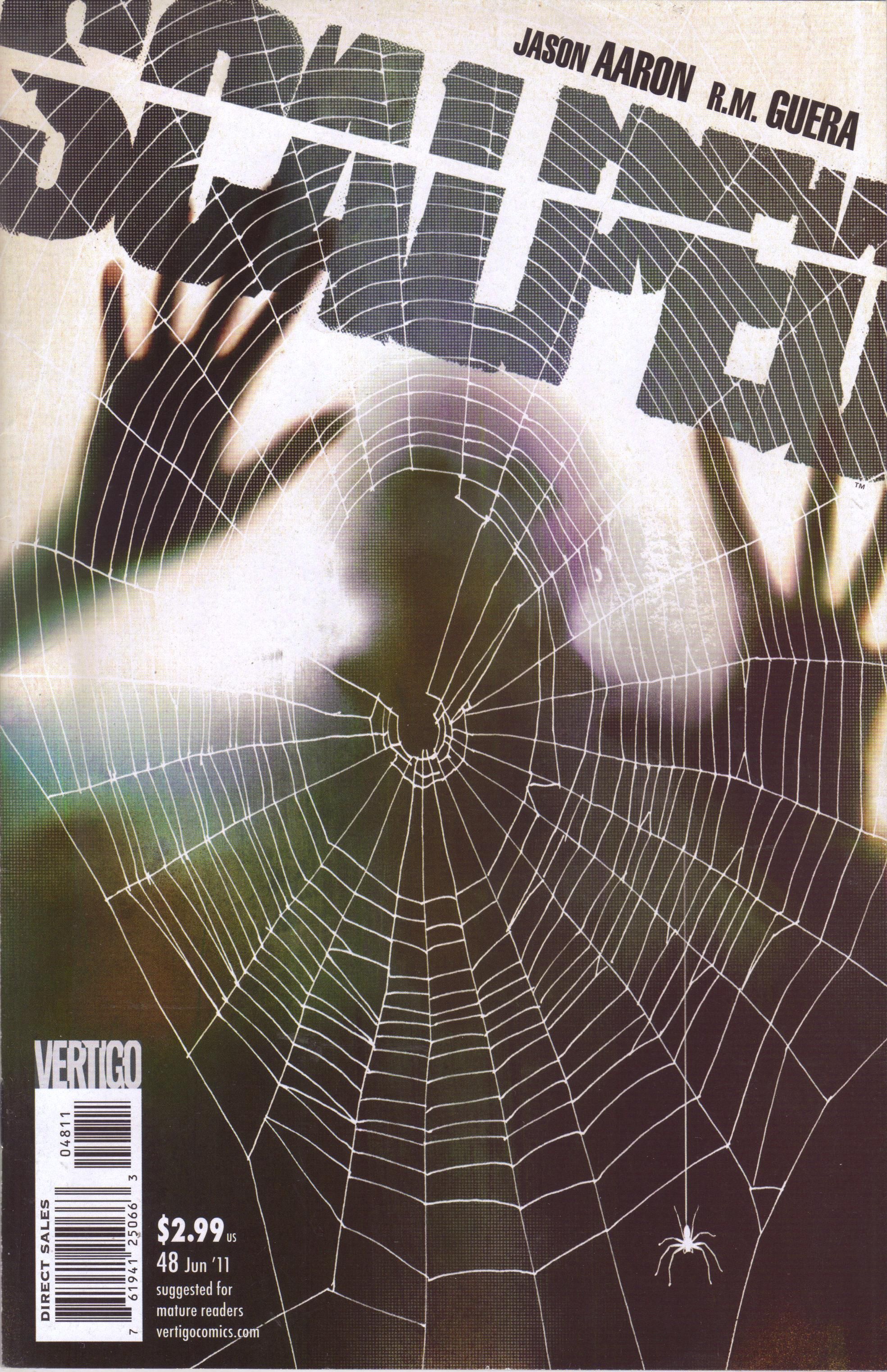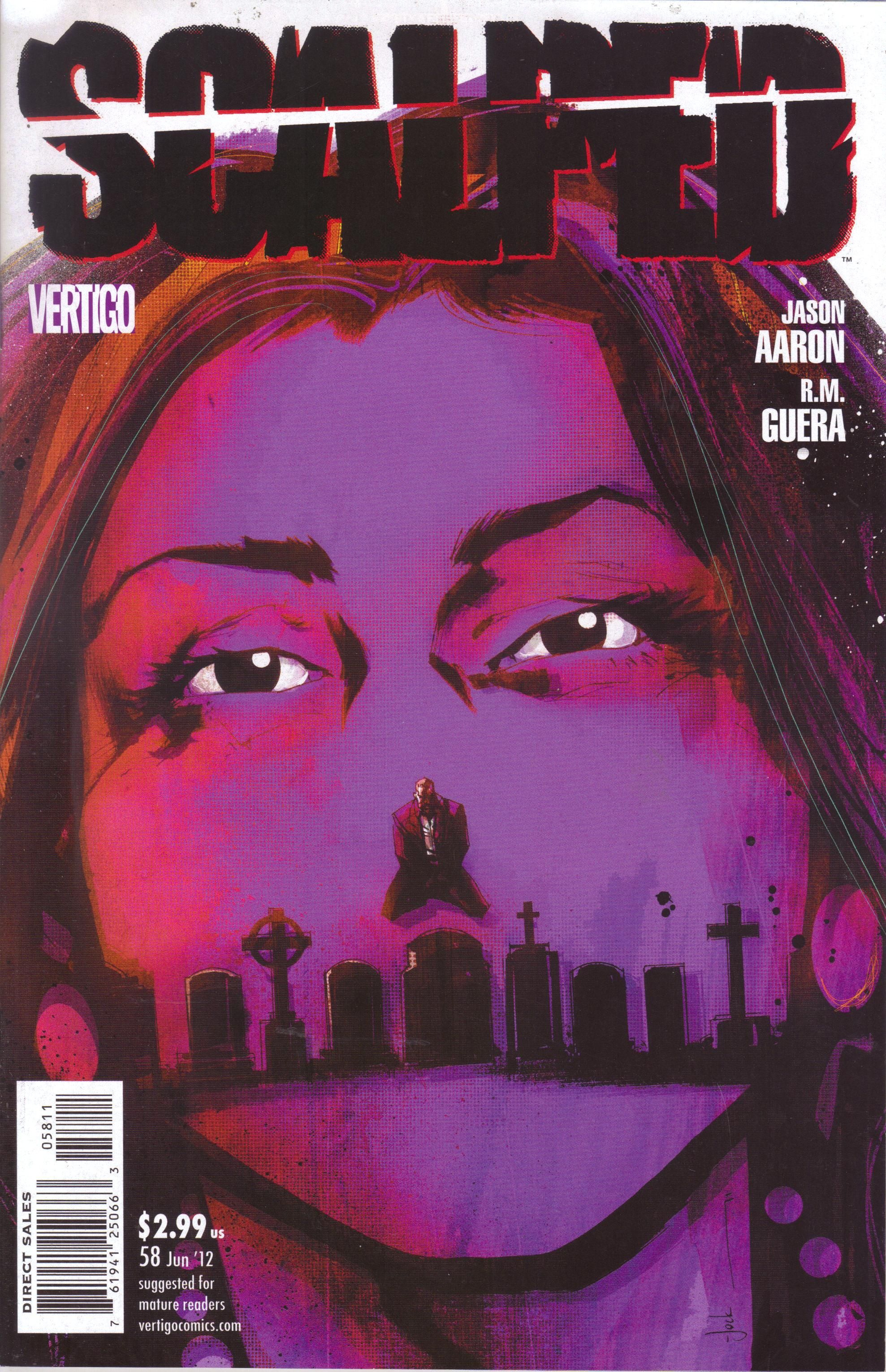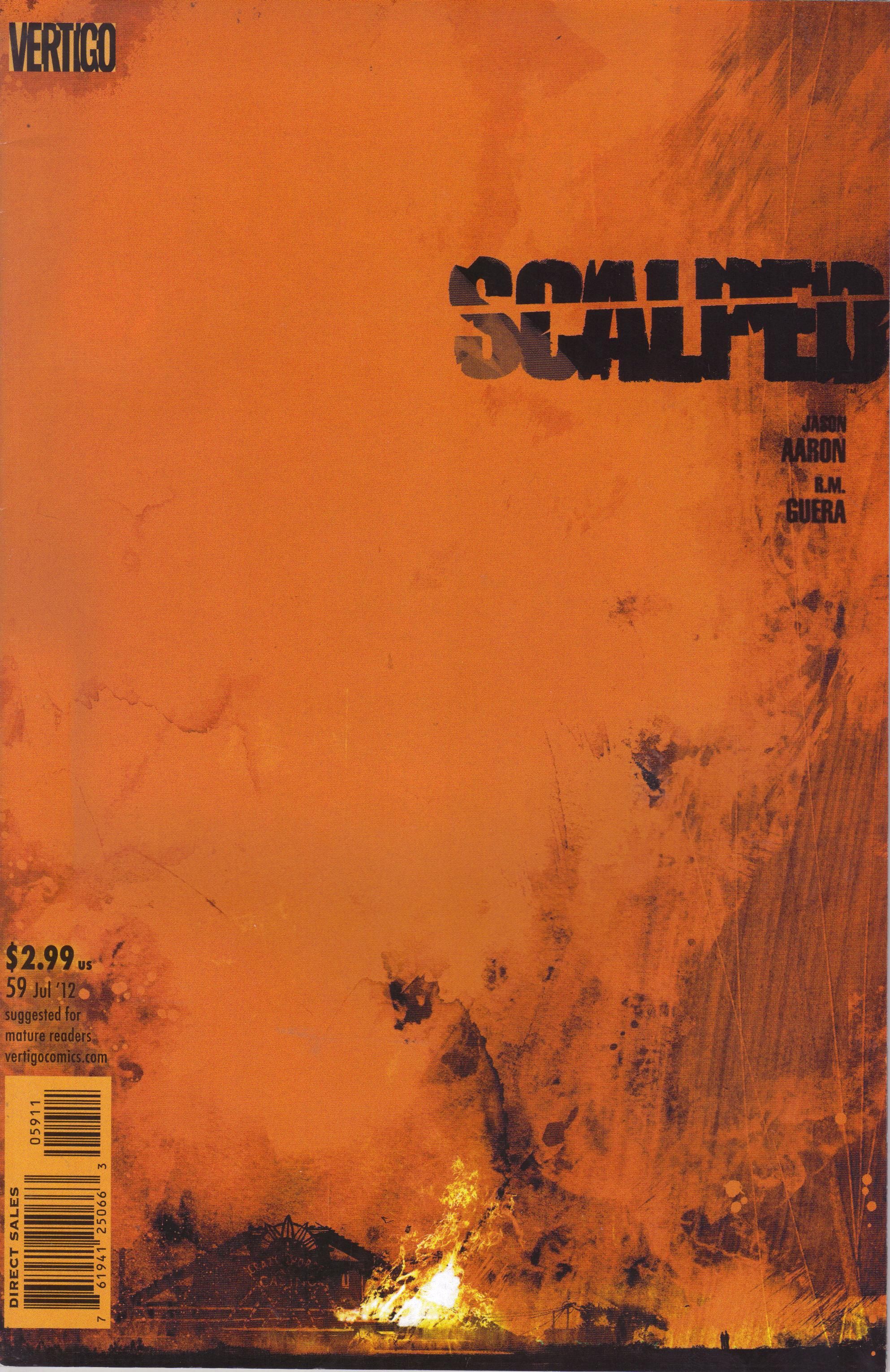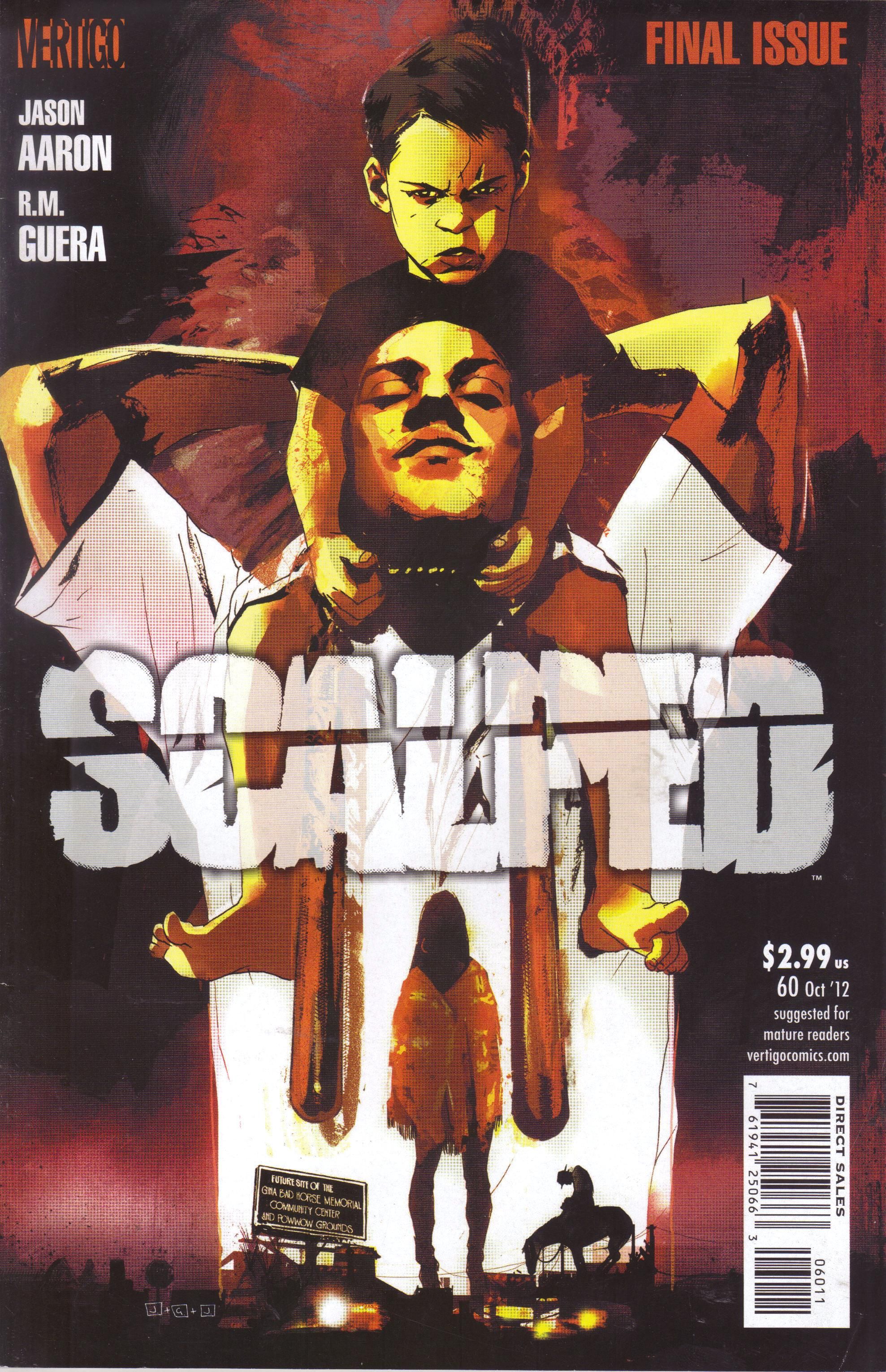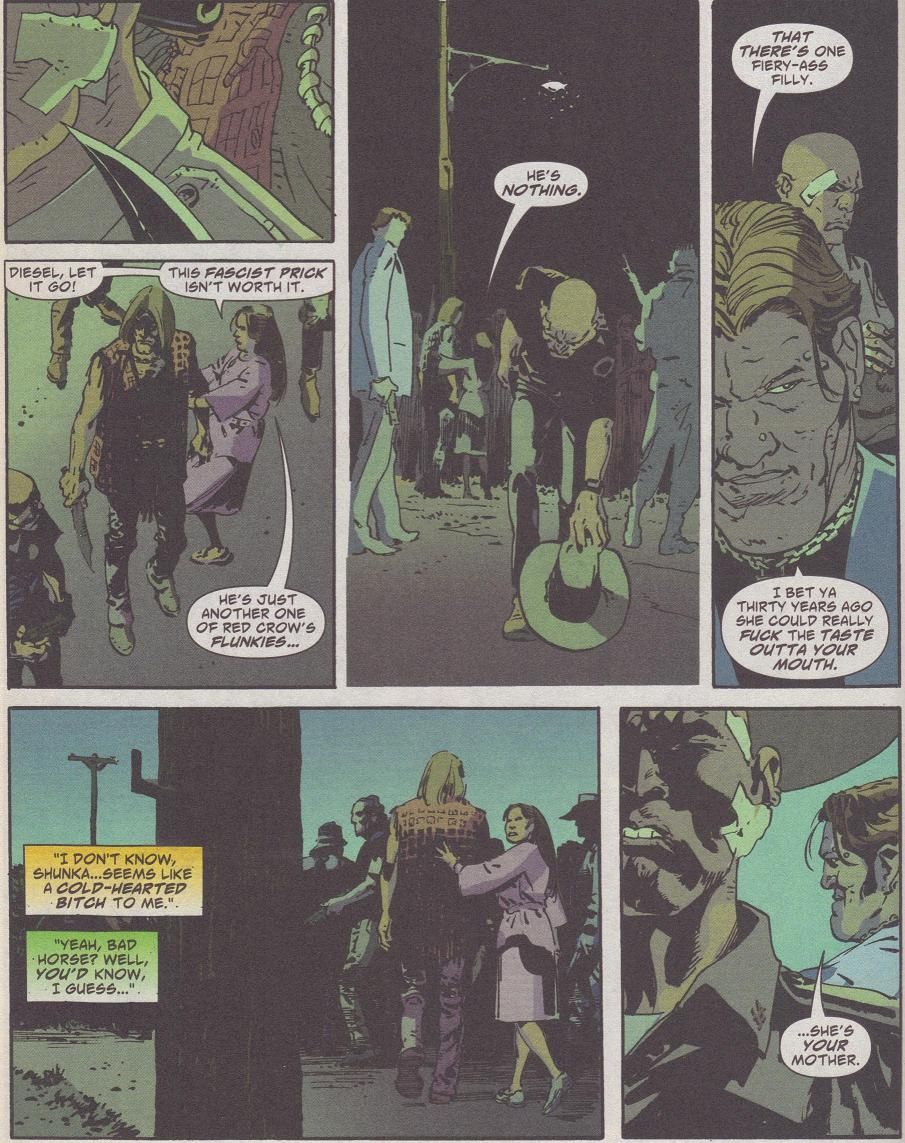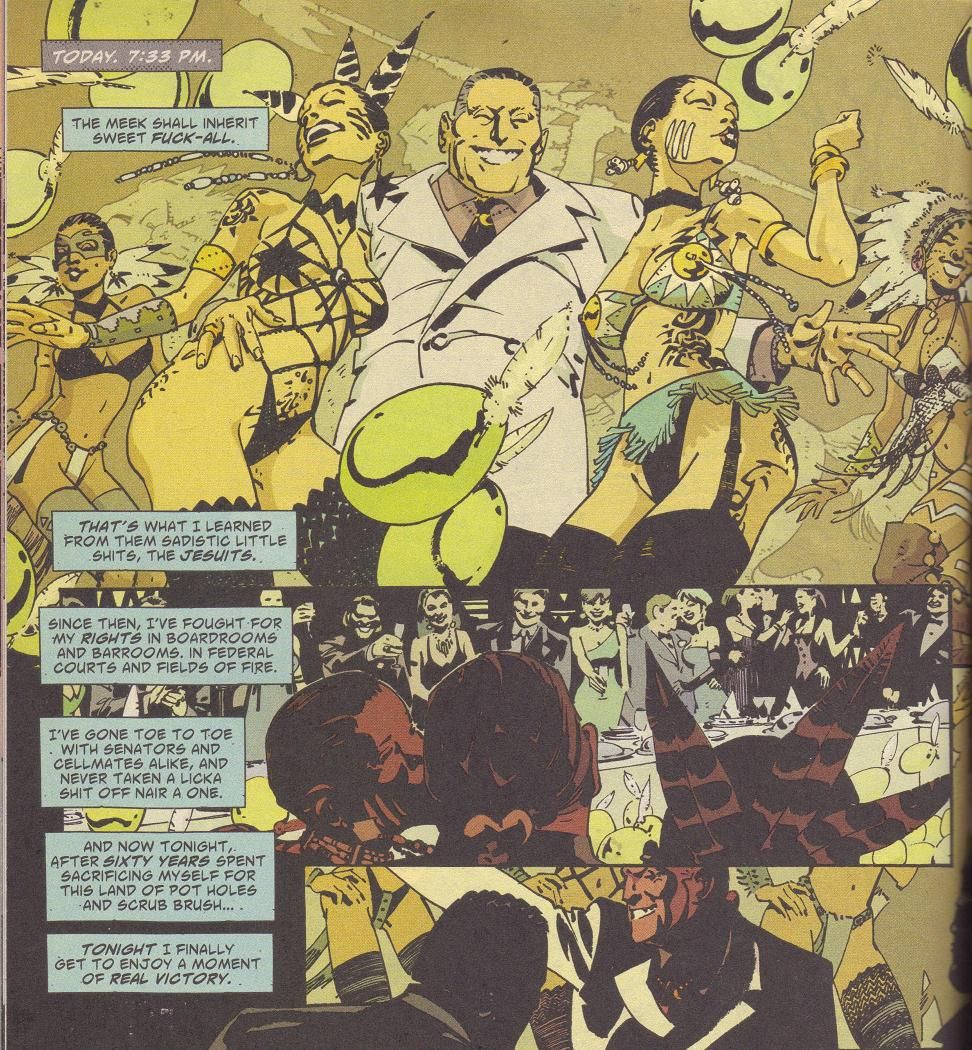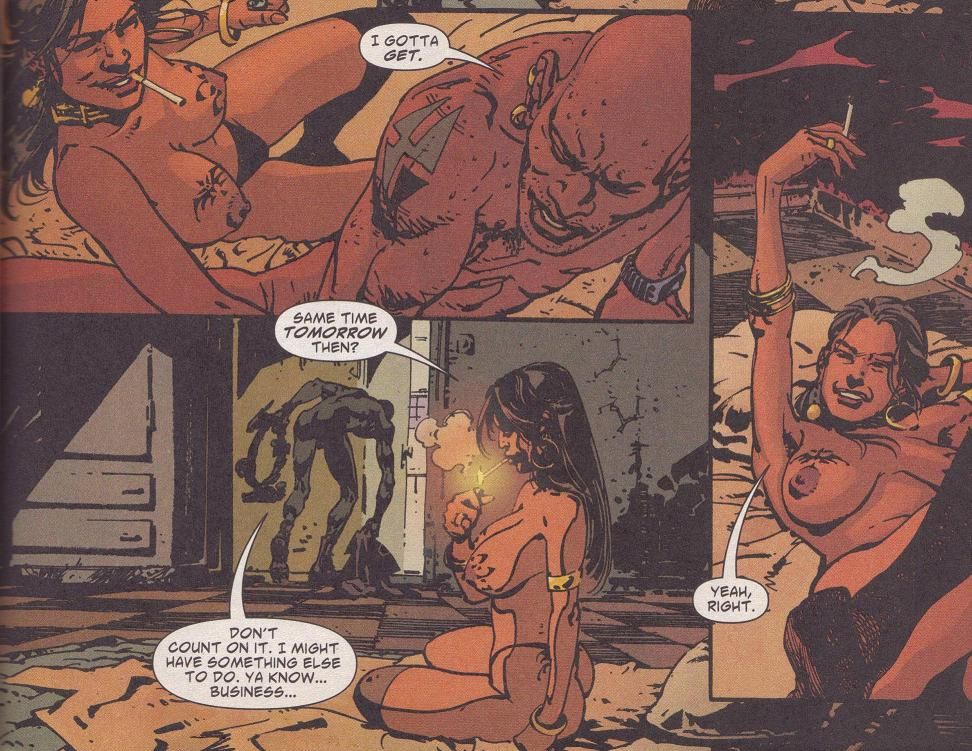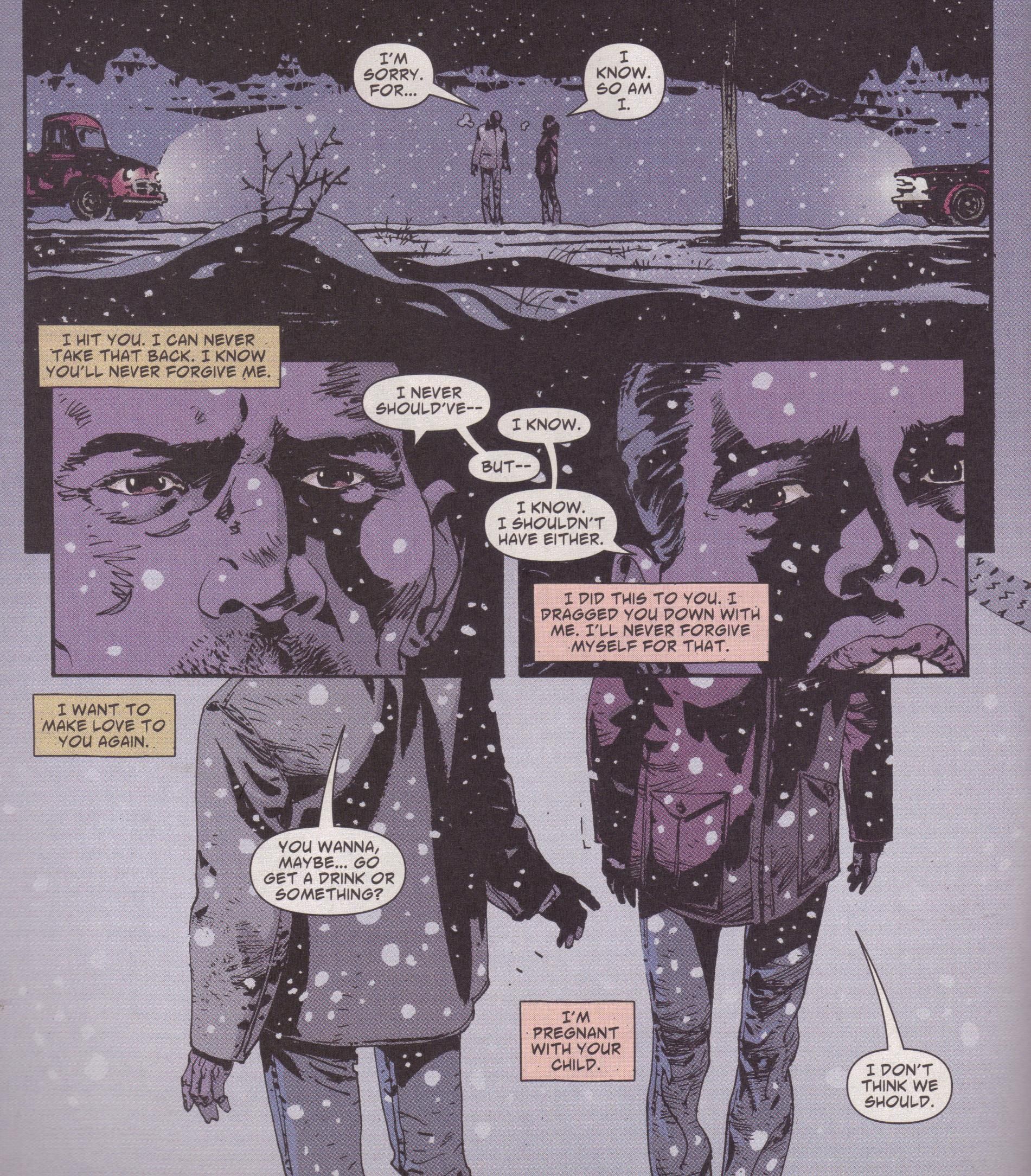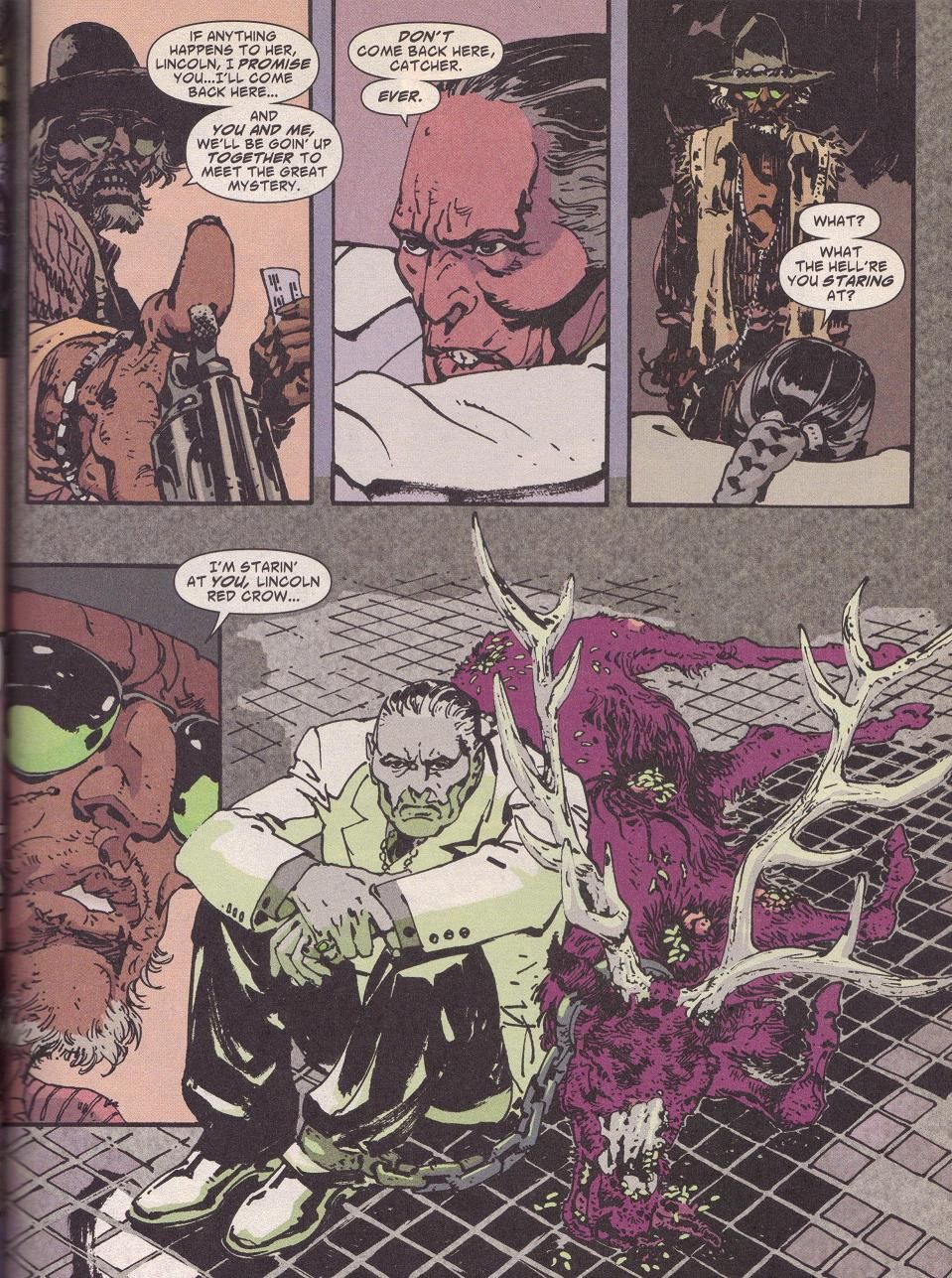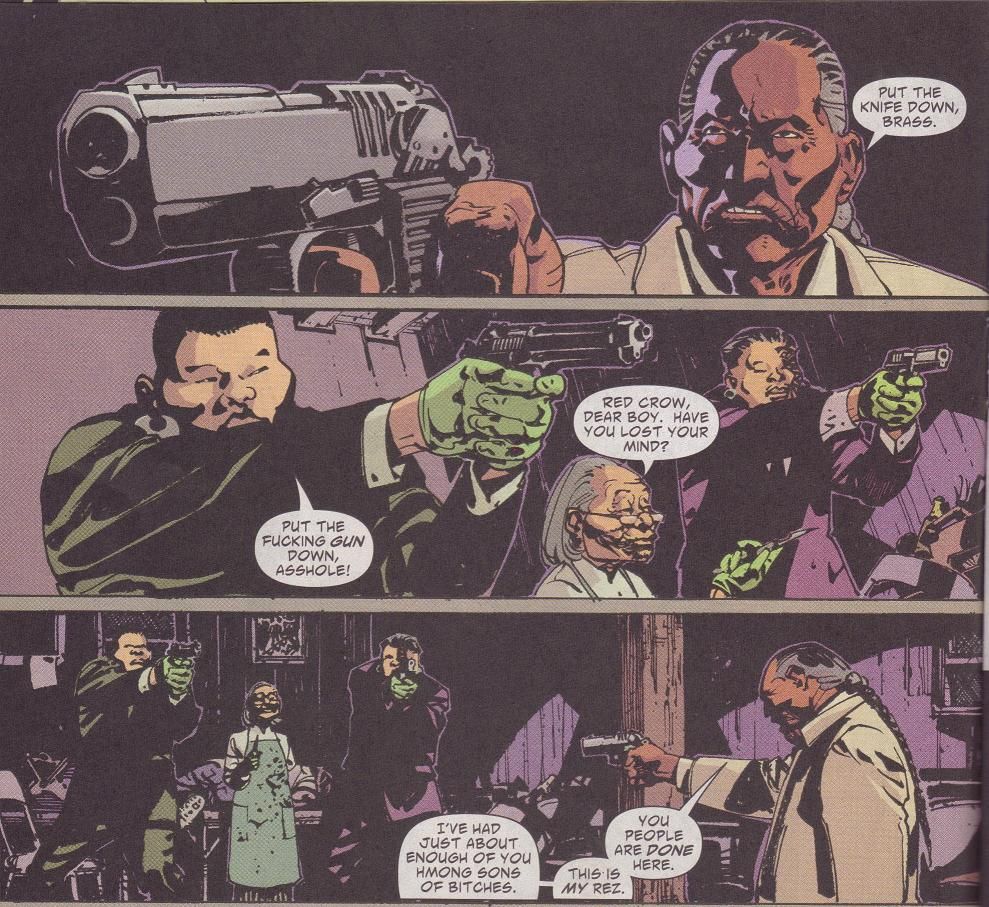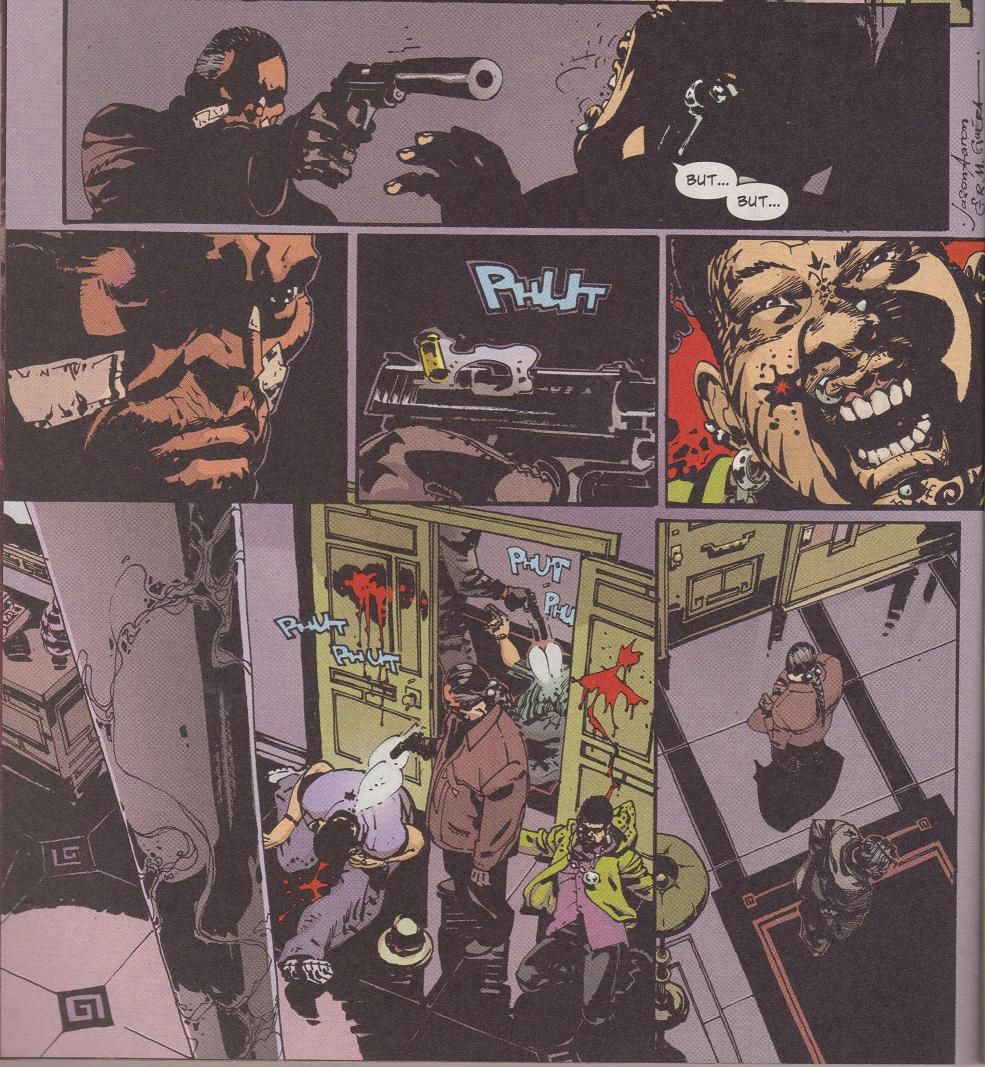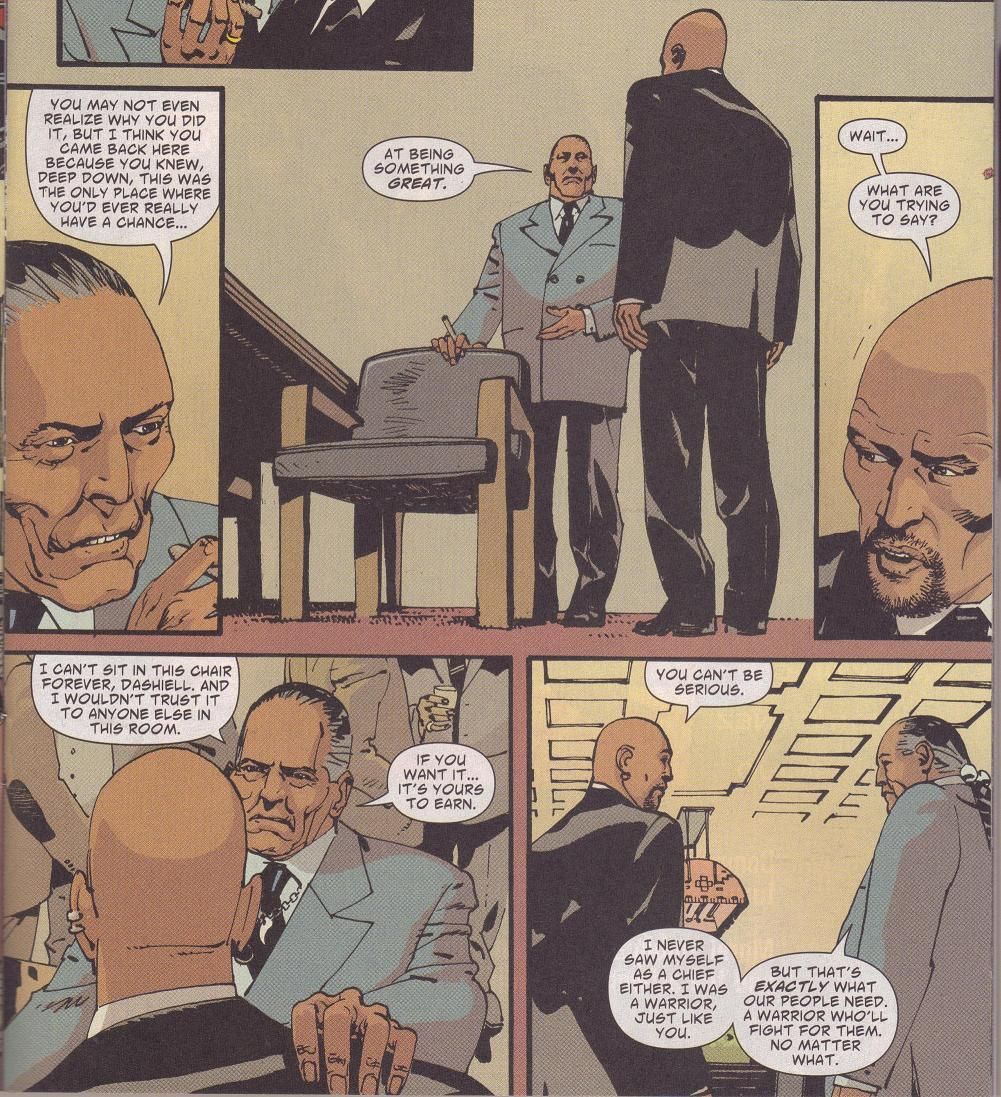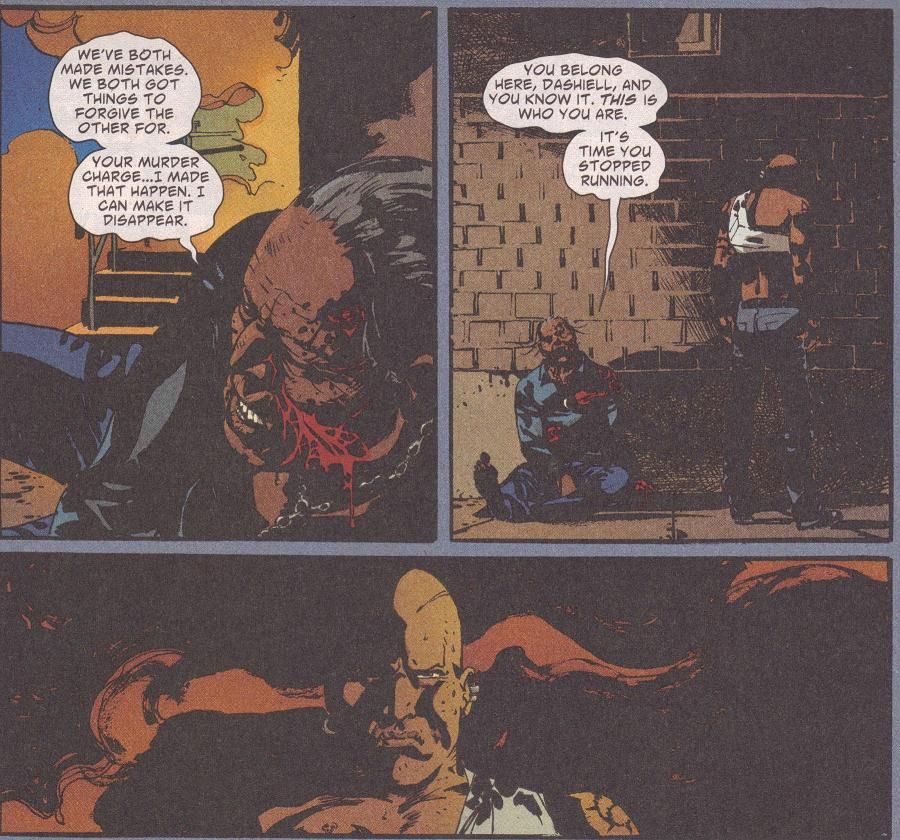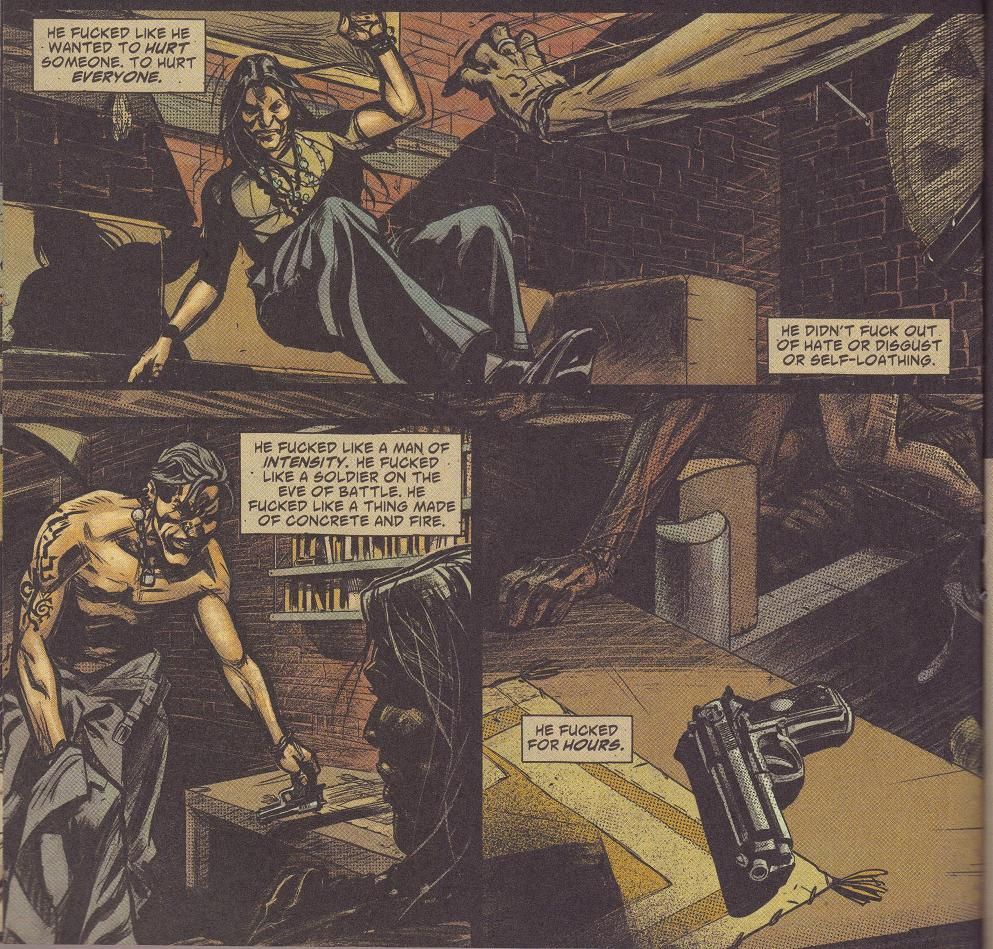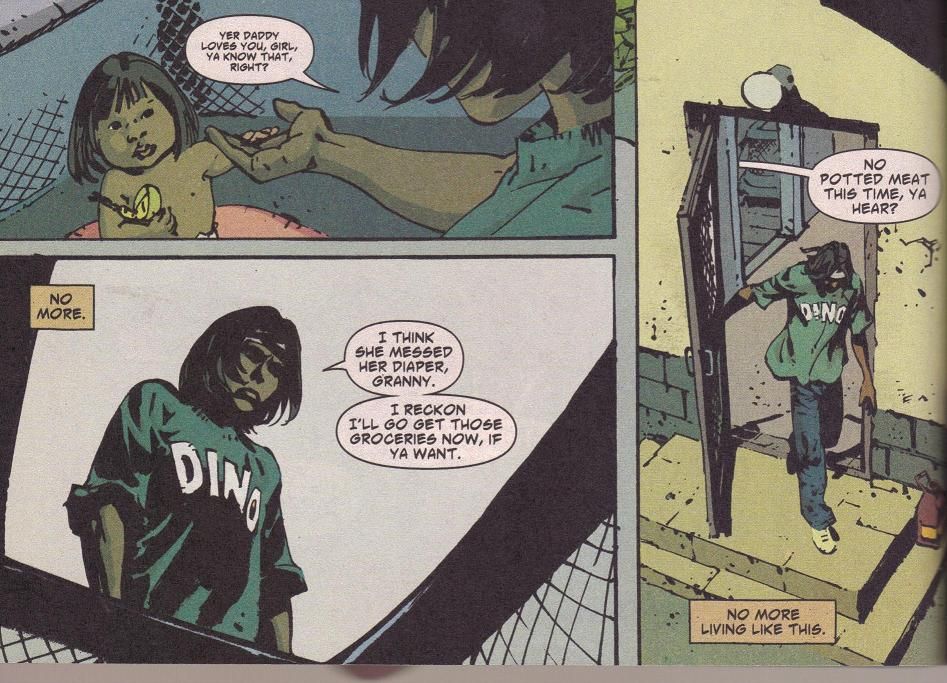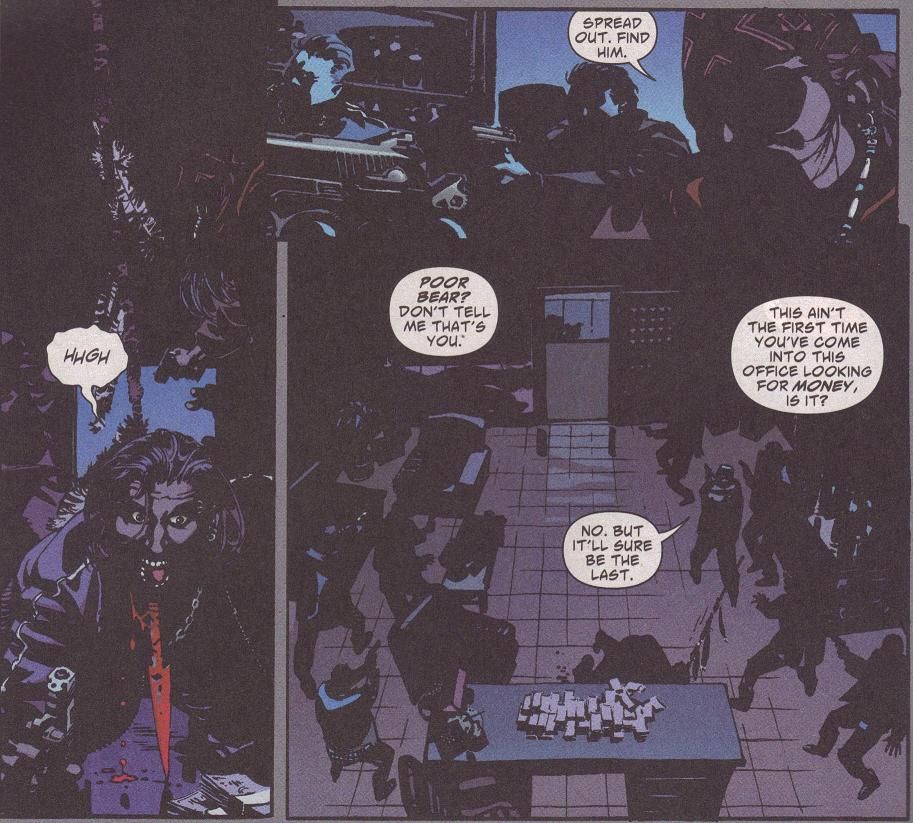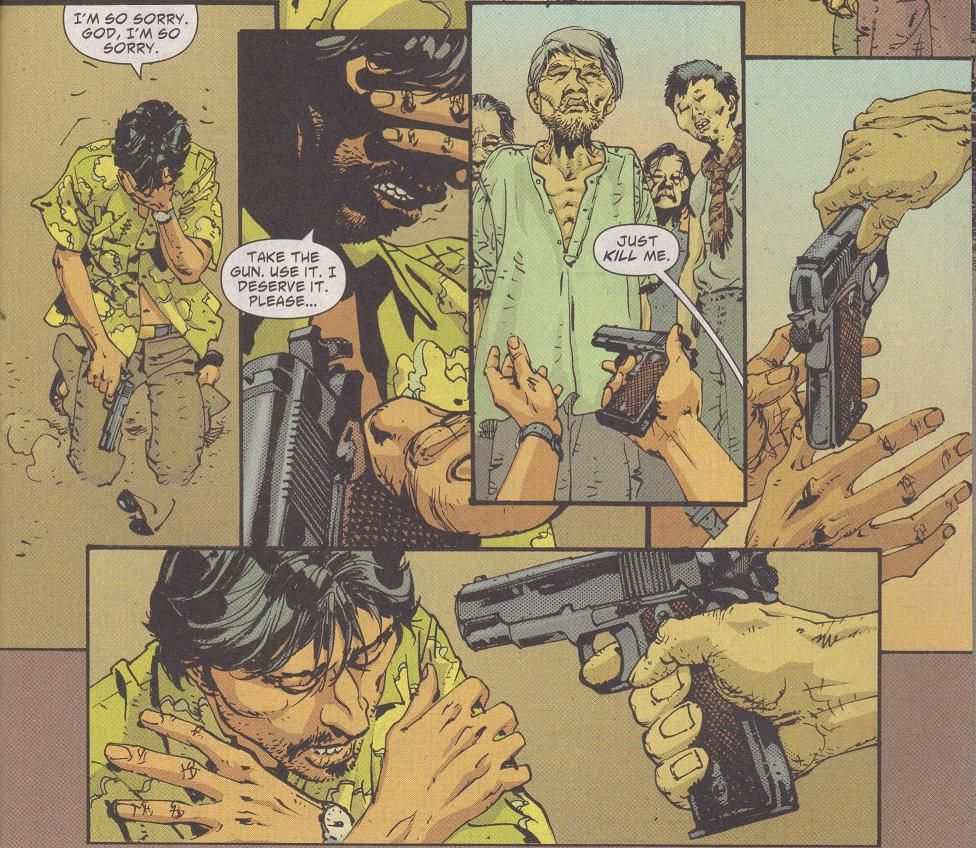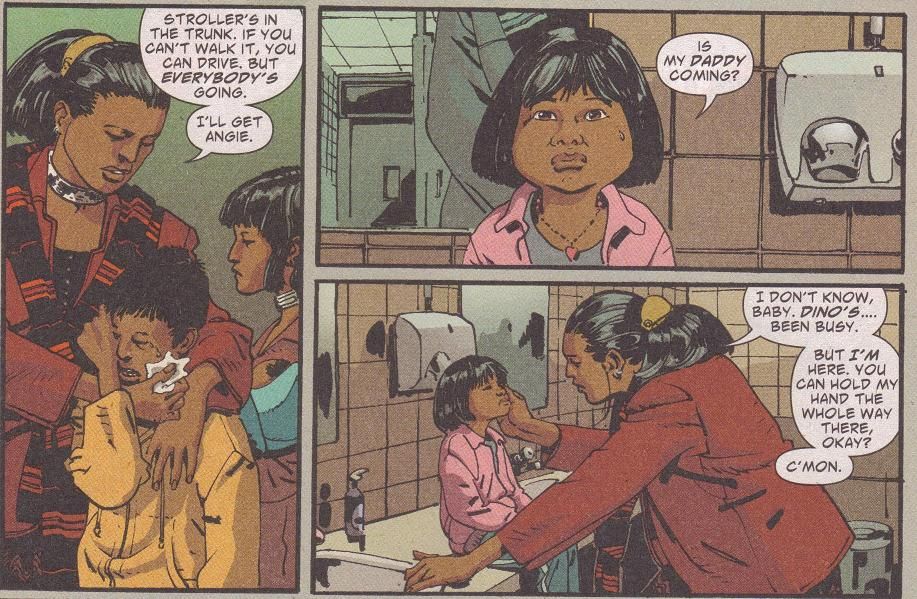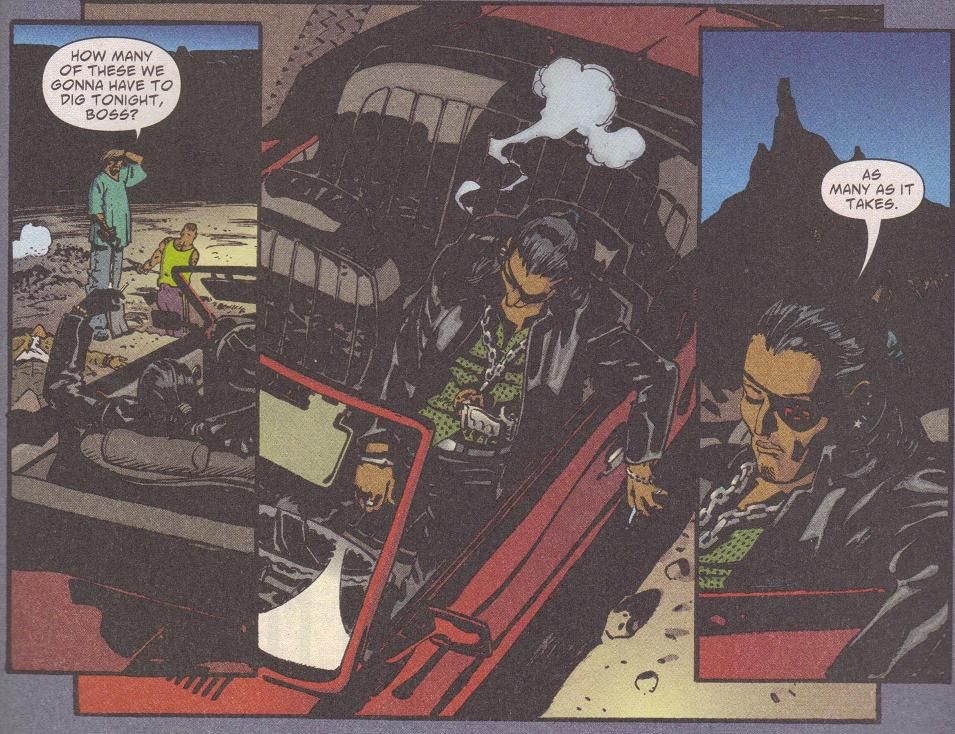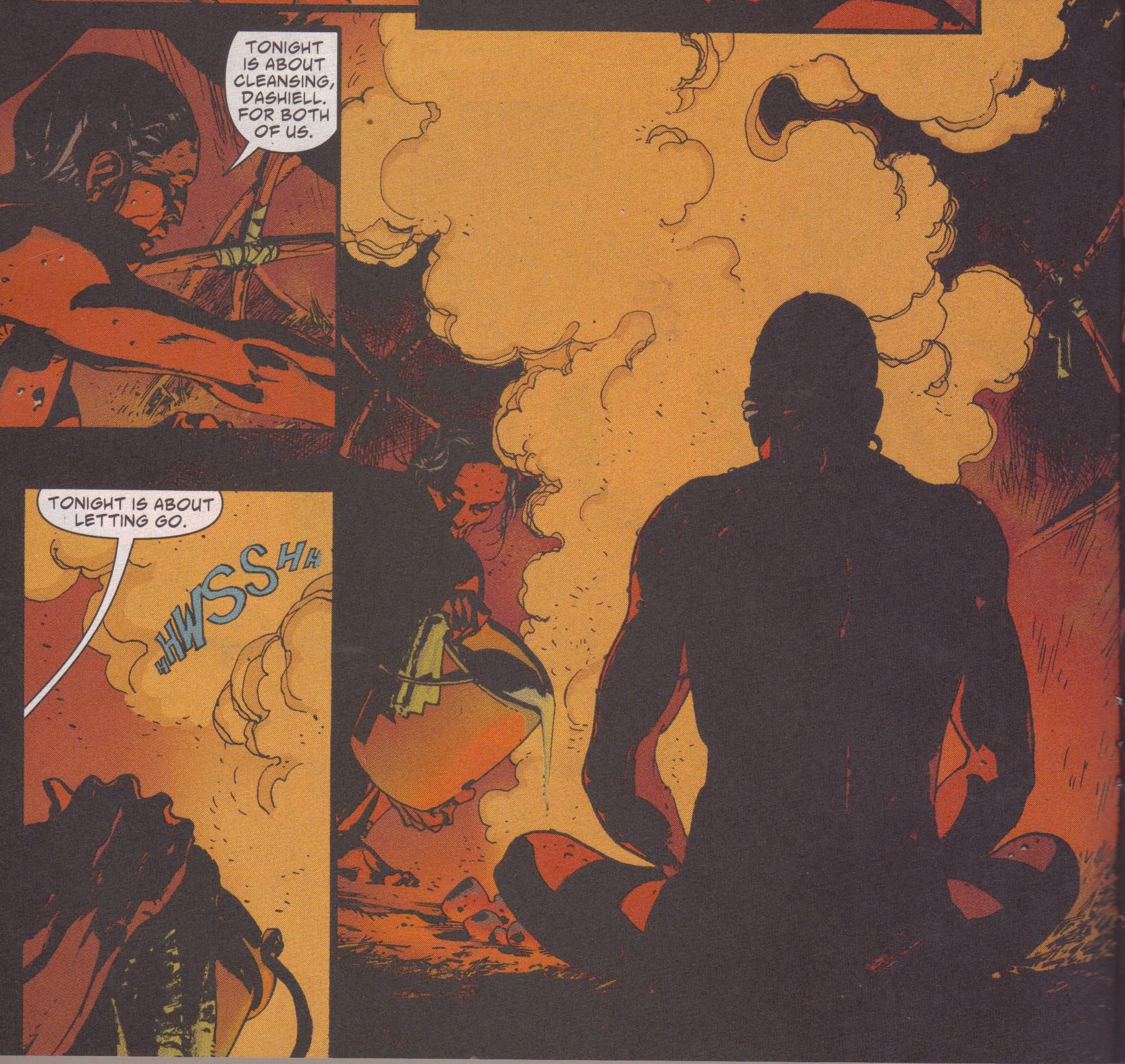Yeah, it's pretty good. But not for the reasons you might think!
Scalped by Jason Aaron (writer), R. M. Guéra (artist, issues #1-11, 13-17, 21-25, 28-34, 38-42, 45-60; letterer, issue #50), John Paul Leon (artist, issue #12), Davide Furnò (artist, issues #18-20, 26, 36-37, 44), Francesco Francavilla (artist, issue #27), Danijel Zezelj (artist, issue #35), Jason Latour (artist, issue #43), Igor Kordey (artist, issue #50), Tim Truman (artist, issue #50), Jill Thompson (artist, issue #50), Jordi Bernet (artist, issue #50), Denys Cowan (artist, issue #50), Dean Haspiel (artist, issue #50), Brendan McCarthy (artist, issue #50), Steve Dillon (artist, issue #50), Lee Loughridge (colorist, issues #1-5), Giulia Brusco (colorist, issues #6-60), Trish Mulvihill (colorist, issues #31, 40), Phil Balsman (letterer, issues #1-10), Steve Wands (letterer, issues #11-47), Sal Cipriano (letterer, issues #48-60).
Published by DC/Vertigo, 60 issues (#1-60), cover dated March 2007 - October 2012.
Oh, yes, there are SPOILERS. But not for some of the big mysteries, although I do kind of let you know what happens to some of the main characters. I try to keep things not terribly specific, but come on!
Scalped is a deeply flawed masterpiece, but a masterpiece nevertheless, and what makes it so fascinating is that Jason Aaron makes it such a great comic despite the flaws and despite his own inclinations to focus on absolutely the wrong people in the epic.
Scalped is an interesting case of a writer thinking the book is about one thing and almost ruining it because he steadfastly believes that, even if it's really about something far more compelling entirely. In many ways, it reminds me of Garth Ennis's run on Hellblazer, which also showed great promise even though Ennis wasn't quite as good as he later became. Twenty years ago (it's been a little over 18 years since Ennis finished that run), a writer could turn around and begin two creator-owned comics, one a true masterpiece (Hitman), and one an overrated but flashier comic (Preacher) and he could deliver on the promise of the earlier comic. In today's comics world, Aaron went off to Marvel to write a bunch of superhero comics. Some have been good and some haven't been, but it's a shame that he might never write another creator-owned epic because nobody wants him to. Anyway ...
Where Aaron goes wrong in Scalped is thinking it's about Dashiell Bad Horse. Dash is ostensibly the main character, and Aaron makes him the focus of the book, but Dash is the least interesting main character in the book, and unlike the other dull character (Carol), he never really gets more interesting as the book goes along. It's not surprising that Aaron uses Dash as his vehicle to get us into the comic and drive us through the book, because Dash provides the reader with the outsider perspective that the book probably needs, but it becomes clear very early on that several characters are far better developed and more interesting than he is.
As the book moves along, Aaron never addresses the problem of Dash, which continues to pull the book down. When Aaron ignores his main character, the book tends to soar. But he always has to come back to him, which is both a necessity and a hindrance.
In case you are unaware, the "hook" of the comic is that Dash has returned to the Prairie Rose reservation in South Dakota after over a decade away. Prairie Rose is a Oglala Lakota reservation, modeled clearly after Pine Ridge, and Dash's mother, Gina, is still living there, protesting against the new casino being built by Lincoln Red Crow, the "president of the Oglala Tribal Council, as well as the sheriff of the tribal police force, chairman of the Prairie Rose Planning Committee, treasurer of the highway safety program, and managing director of this here brand spankin' new casino," as Red Crow himself tells Dash when they first meet (well, meet again, as Red Crow knew Dash when he was a boy). Red Crow hires Dash to be his muscle on the police force, but at the end of issue #1, we discover that Dash is actually a special agent for the FBI, sent undercover to build a case against Red Crow. Thus the storytelling engine of the series is revealed - Dash will try to bring Red Crow down, despite all the hardships that will entail.
This grand plot led people to describe Scalped as "The Sopranos on the rez," which is an unfortunate and largely incorrect description. People are often desperate to fit something new into a familiar category, so they have to break out the comparisons. Yes, Scalped is a crime-noir title, but the FBI's case against Red Crow and Dash's attempts to build it are by far the least interesting aspects of the book. This is partly because Aaron doesn't do enough with Dash himself, so it's tough to care too much whether he succeeds or doesn't. Dash careens from mishap to mishap, many of them ridden with clichés. He gets involved with Carol, Red Crow's daughter, with whom he was in love when they were both young teens. Carol's story, for a long time, is itself drenched in stereotypes, and when Aaron focuses on their dysfunctional relationship, Scalped is at its worst.
Dash's relationship with Carol is the fairly typical "I hate you but I like to fuck you" kind of thing we see far too often in noir, with the result that it's never convincing, even when in issue #42, when Dash and Carol meet each other on a snowy road and can't say what they need to say to each other about their "romance." Carol never tells Dash that she's pregnant and she gets an abortion alone, which ought to feel more powerful but just comes off as another cliché. Another problem with Dash is that he's a terrible FBI agent, so as he gets further into Red Crow's empire, he becomes more and more unhinged, but again, Aaron doesn't make him an interesting enough character to make his predicament all that compelling. Carol is addicted to heroin, and Dash starts smoking it in issue #20, but his dalliance with drugs never feels all that important, and he recovers relatively quickly. The drug addiction simply feels like another "It's a noir book, so of course the protagonist gets addicted to drugs" kind of throwaway plot, and when Aaron got bored with it, he just hand-waved it away. Dash is that kind of character - ultimately, he's a plot device, and this hole in the center of Scalped makes it more difficult to appreciate some of the other characters, who are much better developed.
Another problem with Scalped is that Aaron was still a neophyte comic book writer when he started it (and even when he finished it), so he leans on some devices a bit too much. The plotting in Scalped is superb, and the pacing is pretty good - it's 60 issues long but it feels leaner than that, but Aaron relies too much on "tough-guy" clichés a bit too often and doesn't always trust his artists. He uses caption boxes to indicate the characters' inner-most thoughts, but very often, he doesn't need to. Guéra, who imbues the entire book with a layer of grit that makes the book feel like you could choke on it, does marvelous character work with body language and facial expressions, and Aaron's tendency to over-write turns the book turgid at times. If we consider issue #42 once again, this comes to the fore. The rupture in Dash's and Carol's relationship is both brilliant and frustrating, as Aaron writes very good dialogue but clutters the page with the two characters' thoughts. We can read what they're thinking thanks to Guéra's art, while Aaron's minimalistic and even banal dialogue cuts to the core of the two characters' inability to say what they mean. The pages are not improved by the narrative boxes:
After this conversation, Carol decides to get an abortion, and again, Aaron makes the reasons behind her decision too obvious by providing caption boxes. He has this tendency throughout the book, and in a very few cases, he makes good use of narrative boxes. Usually, however, they're unnecessary, and they hold back the comic just a bit. Writing is a tightrope, and writing for comics possibly even more so, as writers are never sure if they can totally trust their artists. It's unusual that Aaron never seemed to fully trust Guéra even after he had seen what the man could do.
If Scalped isn't (or shouldn't be) about Dash Bad Horse and his journey, then what is it about? This is where the book becomes a great comic, one worthy of your consideration. Scalped is about history and how history affects the present, and Aaron's work in that regard is magnificent. One of the weaknesses of Dash's character is that we never find enough about what molded him. He was a soldier in the Balkans and an FBI agent in the Deep South, but Aaron barely touches on those life-altering events.
Dash is making his own history, perhaps, and that's why Aaron doesn't do much with him, but when he gives us so many other characters whose lives have changed them so profoundly, it feels lacking. Obviously, the dominant character in Scalped is Lincoln Red Crow, one of the best characters in comics over the past decade or so. When we first meet Red Crow, he's sitting at his desk in the soon-to-be-opened casino, smoking a cigar. A scalped, dead body lies next to the desk, and Red Crow's bloody knife is stuck in the desk. We never find out who the corpse is or why Red Crow killed him, but the image is a powerful one, especially for those reviewers of the series who wanted a hook to describe it. It seemed easy to call Red Crow a crime boss, and he is, but even in this first issue, we begin to see that there's more to Red Crow than that. When he drives Dash around the reservation, he talks about his experiences in the 1970s, when he was part of a protest group that occupied the Bureau of Indian Affairs offices in Washington, D.C. He also talks of the murder of two FBI agents on the reservation in 1975, which is lifted from the actual event on the Pine Ridge reservation. Red Crow talks nostalgically of these times, but he's also aware enough to point out that nothing changed: "Here we are, still forgotten, still a third world nation in the heart of America." Is it so surprising that he has decided to cash in? The casino will change that to a degree - "the free ride's finally over," says Red Crow. "From here on out, the white man better bring his fuckin' debit card" - but Dash doesn't care about any of that. He tells Red Crow, "The Indian Wars are over, and you guys fuckin' lost." Obviously, Aaron seems to be setting up a situation where Dash might begin to feel differently, but ironically, it turns out that it's Red Crow who begins to change.
Red Crow isn't just a simple crime boss, and that's why the comparisons of Scalped to The Sopranos, among other things, is misguided. He's a politician, too, so he does things that politicians do, and occasionally, they're even beneficial to the community at large. We also begin to find out more about his past.
He was in love with Gina Bad Horse, Dash's mother, but didn't stay with her. He was at the scene when the FBI agents were killed, and he knows who killed them. He was placed in a Christian Indian school when he was a child, where he was beaten if he spoke Lakota. He's had to make some shady deals to get the financing for his casino with a Hmong gang in Minneapolis, which causes him a great deal of trouble when the gang's enforcer, Mr. Brass, shows up to "assist" in keeping order on the reservation. The choices he's made inform who he is and how he moves forward, and it makes him far more complex than the ostensible main character of the comic. The engine of the story quickly shifts from Dash trying to bring down his boss to Gina's murder, which we first learn about at the end of issue #6. What happened to Gina and how it affects almost every other character is far more important than Dash's undercover work. It also causes Red Crow to question his place in the world and how he can change. His turning point comes in issue #21, when Agnes Poor Bear, a tribal elder, brings him Gina's "soul bundle." As she explains:
It has to be kept for a year before it can be released. The person who keeps it must live a harmonious life. No fighting, no arguing. Everything they do must help to purify the soul. So that once it's released it can travel the spirit path and return to Wakan Tanka. If this is not done, the soul will wander the Earth forever. Lost and alone.
Red Crow tries to demur, claiming Dash should get it, but Poor Bear tells him Dash isn't ready for the responsibility. Aaron does a nice job with this issue - he begins it with Red Crow and the soul bundle in a car, "three weeks from now," and Red Crow apologizing, then walking into a diner with a gun. Aaron doesn't go into the diner, but the sound effects tell us that someone is shooting a gun. We don't know at that point what the small bundle on the seat next to Red Crow is or why he's apologizing, but by the end of the issue, we know he's not up to the task. This is also a crucial issue because Mr. Brass has killed two young people after raping them, and Red Crow has to decide what to do about it. This gives him a perfect opportunity to make amends by reining Brass in, but he struggles with that because he knows that the Hmongs are keeping track of him. In issue #22, he learns that he has a federal agent inside his organization, and that leads to a flashback where he kills Reggie Standing Rock, one of the Dog Soldiers in the 1970s, because he believes Reggie is a mole for the FBI. Reggie was the first person he killed (and he wasn't a mole, as it turns out), and Red Crow remembers it because the girl Brass killed was Reggie's granddaughter. He's still trying to do right by Gina, but he also needs to make amends to Reggie's granddaughter, and in issue #24, we learn that he goes into the diner to arrest Brass. As it turns out, he happens to save the life of Dino Poor Bear, Granny's grandson, who's been acting as a drug courier and was about to be killed by Brass. He kills the two punks with Brass and arrests Brass, and he realizes that he's never going to be able to do what Granny wants him to do.
The reason why this is such a powerful story arc is because by accident, Red Crow does the right thing, but he can't see it. Yes, he's a man of violence, but he arrested the man responsible for a heinous crime and saved a young man's life. This is the beginning of the transformation of Lincoln Red Crow.
Aaron wisely doesn't take Red Crow too far, too fast. He's a bad man, after all, and he's lived his life doing bad things. As he puts it at the end of issue #24:
My name is Lincoln Red Crow, and I consider myself an honorable man. Spiritual. Respectful to my elders. Kind to animals. A friend of nature. A tender lover. A benevolent politician. An honorable man, sure, but that doesn't make me a nice guy. If there's one thing I ain't, it's a nice guy. I've killed too many men. Women too. Some with the wave of a finger or a spoken word. Some with my own two hands. And I'll kill a hundred more, if that's what it takes to see my vision through. To carve a better place in this world for my people. To leave this rez better off than I found it. Like it or not, that is who I am. Who I'll always be. I do what I do because someone has to. That may not make me popular in some circles, but so be it.
Red Crow believes that what he's doing is right because he has to play the game the way the conquerors do, and that means he has to give up his soul to do it. After this arc, he slowly begins to wonder if he's right. Aaron puts him on a crooked path, though, because what he's done isn't easily undone. But he begins to live more by his more noble sentiments, even if he can't figure out how to do that correctly. He has to figure out what to do with Mr. Brass because he doesn't want to be under the thumb of the Hmongs, and when the leader of the gang, Johnny Tongue, pushes him too far, he simply shoots Brass in the head. It might be the "right" thing to do, but of course Red Crow has to take the worst possible path to do it. It's a murder, which is what the FBI wants to pin on him, but Dash didn't see it. The only witness is another prisoner, and the story arc (issues #30-35) becomes about the witness and Dash's attempts to rescue him, Red Crow's attempts to kill him, and the mounting suspicions of Shunka, Red Crow's right hand man, about Dash. There's another crucial murder in this arc, as Dash kills Diesel, another undercover FBI agent. Diesel had raped and killed a woman, then shot her son when the boy tracked him down for revenge. The link between the two murders is, of course, that both Diesel and Brass are vicious killers who deserve to die, but the murders have different consequences. Both men seem to get away scot free, as Dash buries Diesel in the badlands and Red Crow's witness gets a bullet in his brain, but Dash's murder comes back to haunt him much more.
It does prove to Red Crow, however, that Dash is his man, and while it points to Red Crow making his life better, as he begins to reject Shunka, who represents his criminal past, for Dash, who represents his more idyllic past, it's also a fatal mistake, given Dash's job. Again, Aaron doesn't make Red Crow's road easy.
The next step of his journey begins in issue #45. Red Crow visits Hassell Rock Medicine, an old friend who has decided to run for tribal president because he thinks Red Crow has lost his way. This comes right as Red Crow is explaining to Dash that he needs a successor and he'd like Dash to be it. The rift between Red Crow and Shunka is widening, as Shunka knows he and Red Crow are still bad men, while Red Crow is starting to believe that he can get out from under his sins. Red Crow sees his spirit animal, a diseased deer (or elk), and he asks Hassell is they can pray together. He also finally visits Lawrence Belcourt, the man convicted in the killing of the FBI agents in 1975 (Aaron's Leonard Peltier stand-in), who helps him figure out who killed Gina. He takes Dash to a sweat lodge and gives him all his trust, another bad move by Red Crow but one that shows he's willing to change. In his eyes, Shunka is too tainted by the past - he's symbolic of his criminal life. Dash, although he's been working in Red Crow's criminal organization, represents a different path that Red Crow could have taken. He tells Dash that he loved Gina, but he pushed her away, and by taking him to the sweat lodge, he symbolically "adopts" Dash. This is ultimately a foolish decision, but it does show that Red Crow is trying hard to atone for what he's done. He still wants Dash to carry on his operations, but he wants to focus more on making the lives of the people better rather than just stealing from them. The final push he needs comes in issue #49, when Hassell has a heart attack right in front of Red Crow. The old man lives, but Red Crow admits to Shunka that he hesitated just a bit before dialing 911. He hates himself for that hesitation, and he tells Shunka it's time to start dismantling his criminal empire. This, of course, will not go over well with anyone.
In issues #51-55, Red Crow takes apart his own empire, and several people turn on him. Shunka almost betrays him, but saves his life at the last second.
Even at this point, Shunka believes that Red Crow will see the light and reject Dash. Red Crow doesn't kill Shunka, but he does tell him he never wants to see him again. This leads to a brutal confrontation between Dash and Shunka, which ends only when Red Crow kills Shunka and Dash arrests Red Crow. In the end, Red Crow might have regained his soul, but he lost everything else. But because he considers himself honorable, he doesn't tell his lawyer about the gun that Dash used to kill Diesel, which is still in his possession and could get him out of prison. He changes his mind because he believes that Dash pressured Carol into getting an abortion - even though Dash didn't even know she was pregnant - and he's released, which leads to a final confrontation with Dash, Catcher, and Dino Poor Bear at his casino. Even then, he still believes he can reconcile with Dash, because he's that desperate for a son. But Dash himself is too far gone. In the end, Red Crow finds a measure of peace, something that is denied Dash. Perhaps it's because he's able to accept his sins and move past them, while Dash continues to carry them with him.
What's really fascinating about Scalped is that even though Red Crow takes over from Dash and becomes the protagonist, Aaron doesn't stop with him. Every significant character changes somehow, which makes Dash's inertia at the center of the comic all the more frustrating. After Carol has her abortion, she begins to find her own path in the world, and she eventually replaces Agnes Poor Bear as the "mother hen" of the community. We think Shunka is just a thug, but when Aaron reveals his homosexuality in issues #36-37, his arc takes on an entirely different light. Shunka is living a lie, and after those issues, we judge how he responds to Red Crow differently. Earlier, it appeared that he had a father-son relationship with Red Crow, and he was jealous of Dash taking that role.
After those issues (and Aaron does a nice job foreshadowing the revelation), it becomes clear that Shunka feels more romantic toward Red Crow, and he acts more like a spurned lover. Shunka doesn't change too much in the course of the comic, but our reactions to his actions change because of what we know. Catcher, one of the old Dog Soldiers who got involved in the deaths of the FBI agents in the 1970s, changes during the course of the book. Aaron keeps us guessing about why he does what he does, whether he has a plan or whether he's just insane. We know, on a logical level, why he takes some of the actions that he does, but does he think of that? He gets the first words of the series, and acts as something of a Greek chorus throughout, living outside the mainstream Indian society but intersecting with it at crucial moments. Baylis Nitz, the special agent who's in charge of Dash, also undergoes changes - not necessarily in a positive direction, but he still goes through some powerful moments. Even a minor character like Sheriff Wooster Karnow, who runs the Nebraska town right across the border from Prairie Rose (it's important because the reservation doesn't sell alcohol, so everyone heads to White Haven to buy their booze) has an epiphany in issue #43 and transforms from a corrupt cop to a man out for justice, which on the one hand leads to his death but on the other hand allows him to die with dignity. Aaron manages to write believable character arcs for all these characters, and even the ones who don't change too much - Officer Falls Down, Diesel, Maggie Rock Medicine, Granny Poor Bear - are developed well and makes Dash's character stand out even more.
The other main character in the book turns out to be Dino Poor Bear, and his character helps highlight the Shakespearean parallels in Scalped. Dash is Hamlet, constantly raging about things instead of taking care of business. There's no reason why he can't bring down Red Crow earlier, and Red Crow is even connected to Gina's murder, although he didn't kill her. So Dash has professional and personal reasons for doing his job, but like the Danish prince, he spends far too much time getting distracted. Aaron, like Shakespeare, contrasts his main character's vacillation with two examples of people seizing the bull by the horns and getting on with it. In issue #13, Dash begins to investigate the murder of a woman in a meth house.
He soon discovers that Diesel killed her, and he can't keep this news from Shelton, the woman's oldest son. Shelton tracks Diesel down and tries to kill him. He gets shot and killed for his trouble, but the point is that he didn't let anyone stand in his way when he wanted revenge against the man who killed his mother. Dash finds out about his mother getting killed while he's investigating the case, and he wants nothing to do with it. Aaron turns Shelton into Laertes in this situation, as he lets nothing distract him from his course, while Dash is always getting sidetracked. But Shelton only shows up in one story arc, and Dino Poor Bear remains throughout the comic. We first meet him in issue #2, when Dash discovers him delivering supplies to a meth house. Dino is a scared kid, and Dash tries to frighten him into going straight. Dino ends up mopping floors at Red Crow's casino, and we also find out he lives with Granny Poor Bear, his aunt and uncle, his sister and brother, and his baby daughter. In issue #10, Aaron shows us a great deal of Dino's home life, and while the issue itself is fairly clichéd (Dino dreams about leaving the rez, but everyone knows he's not going anywhere), it does show that Dino has ambitions and that he wants to provide for his daughter. Over the course of the series, he gets deeper into the world of crime, and he loses an eye when Mr. Brass tortures him in issue #24. Later, when Carol comes to live with the Poor Bears, Dino falls in love with her. In issue #47, Aaron focuses on Dino, as he thinks about making his intentions known to Carol. At the same time, he decides to turn in friends of his who killed a teenager in a hit-and-run. He thinks that declaring his love and standing up for victims will make him a man, but then he learns that Carol thinks of him as a brother, and he never gets his chance to tell her how he feels. It's a devastating moment, and Dino never recovers. He becomes a criminal, and in issue #54, he kills Sheriff Karnow, and obviously he can't go back from that. Unlike Dash, Dino seizes opportunities, even if they're absolutely the worst ones he could seize.
When Red Crow seems weak, Dino moves in with his gang to take over, even though he owes Red Crow his life. Red Crow doesn't even mind: in issue #59, he says, "I knew somebody would come. It's a smart play. I gotta say though ... I never had you pegged as the smart one." Dino survives the series, but he has become as lost as Dash is. Aaron doesn't make it obvious, but it's a classic case of the road to hell being paved with good intentions. Dino wanted to provide for his daughter and win the love of a girl. He couldn't figure out how to do that except the way he chose, and his story is by far the biggest tragedy in Scalped.
As I noted above, one thing that separates Dash from the rest of the characters is his lack of history. Dino doesn't have much of a history, either, but that's because he's so young. Other than that, Aaron grounds this book in history, and it's that sense of continuity with the past that makes the other characters feel so real. Red Crow, Gina, Catcher, Lawrence Belcourt, and Wade (Dash's father) all have connections that go back decades, so every conversation they have is weighted with extra nuance and meaning. Over the course of the series, we discover that Red Crow wasn't always a bad guy, but circumstances kept pushing him down that road until he seized the opportunities. Catcher appears to be a naïve and frightened young man until he sees too much and becomes the creepy and possibly insane character we see in the present. Wade, who fought in Vietnam, becomes a better person when he realizes that he's betraying his history. Everything leads from the confrontation on the reservation in 1975, and Aaron does a nice job of teasing out what really happened over the course of the series, so that when we finally see what happened, it's not that big a surprise. Aaron doesn't just highlight those characters, however. In issue #8 we first find out why Diesel, a blond white guy, is so insistent that he's "one-sixteenth Kickapoo" and why it makes him so angry when anyone questions that. In issue #26, Aaron returns to Diesel and we find out more about his Indian obsession and the lessons his abusive father taught him.
In issue #27, we read about Agent Nitz and Aaron shows us why he's so keen on putting Red Crow in jail and why he hates Indians so much. All of these stories don't always make the characters more sympathetic, but they show how people reach a point in their lives. Both Diesel's and Nitz's obsession with Indians - in different ways, true, but they're both obsessed - leads to disaster. All of the characters with a history discover that you can't outrun it, and that makes their arcs even more tragic. As a writer who enjoys writing "macho" comics (I don't know Aaron, so I don't know what he's like, but he tends to write "tough-guy" comics), Aaron is very concerned with father-son relationships, and the interesting thing about Scalped is that he turns that on its head a little - the two most significant parent-child relationships in the book are between Gina and her son and Red Crow and his daughter. It's the idea of the relationship and what it means, however, that's important, and it gets back to the history of these characters. Red Crow could easily have been Dash's father, and when Wade returns to the reservation, this tension becomes clearer - Wade says, "He's not your son, Red Crow. He never will be," and Red Crow responds, "You're right, Wade. He's yours. That's the fucking problem." Red Crow aims to replace Wade in Dash's life (even though Wade has never been part of Dash's life), and this desire for an heir is his undoing. Meanwhile, Dino makes his choices ostensibly to provide a better life for his daughter, but Aaron not-so-subtly implies that Dino is going to turn into Red Crow and Angie, his daughter, will become like Carol. Luckily for Angie, Carol has changed, so she has taken the girl under her wing in an attempt to steer her the right way. Once again, Dash is the odd man out - he gets Carol pregnant, but doesn't show her enough to convince that he's a man who will stick around, so she doesn't even tell him about it.
He is never given that chance that so many other characters get - a chance to change - because Aaron implies that he's not up to the task. Family means nothing to him, and so the book ends with him cut off from any chance to have a family of his own. That's the tragedy of Dash, one he doesn't even understand.
With all of these themes running through the book, it's easy to overlook Guéra's stunning artwork, and I'm not going to write too much about it. However, Guéra (who's Serbian but presumably calls himself by the more Spanish name - his original name is Rajko Milošević - because he lives in Barcelona) is superb on this comic, as he manages to cram so much onto each page while keeping the storytelling clear. This is a hallmark of European artists, who are used to getting a lot of information onto the page, and it makes Guéra's splash pages all the more dynamic. This is one of those rare comics where the dirt and odors are almost real, because Guéra's sense of the grittiness of the American Midwest is so tactile and the characters are so part of the landscape. It's a brutal book, sure, but there are also moments of amazing beauty, and Guéra and colorist Brusco do a wonderful job with the mood of the book, using earth tones well but also using the deep blues and purples of night and starker blues and whites for sequences set in the past. As so much of the book is dark, Guéra uses shadows exceptionally well, highlighting the despair that so many of these characters feel as they try to figure out what went wrong in their lives. Guéra is tremendous with facial expressions, too. In the comic's final pages, we see Dino sitting in car, trying to literally bury his past, and Guéra nails every tortured emotion that's running through him at that moment:
This is just one of the many examples of superb characterization that makes Aaron's script work even better. Guéra is a fast artist - he drew 48 (and some of a 49th) of the 60 issues, and he gives the book as distinctive a look as Aaron gives it a distinctive voice.
Obviously, Scalped created some controversy, especially early in its run. FotB Rob Schmidt collected a lot of stories about the series early on in its run, and I encourage you to check it out (although a lot of the links on the page are now broken). I spoke to Rob recently and he said he hadn't read beyond the first arc, and I agree that the early issues are somewhat stereotypical. I'm not sure if Aaron was unsure if he could do an ongoing series, as this was so early in his comics career, or if he wanted to grab everyone's attention with all the violence and sex, but the book becomes far more nuanced after the first six issues and especially after issue #11. The series has been collected into 10 trade paperbacks that are readily available, although 5 Omnibus editions would look really nice, wouldn't they? There's a lot more to Scalped than crime, and it would be a crime if you dismissed it as such (dang, I'm sorry - I couldn't resist!).
While you're waiting for the next giant "S" series of Comics You Should Own to show up, be sure to check out the archives! Lots of good stuff there!

